#and yes yes the 'scale changes things' argument is true but only to a point
Text
See the further irony is:
That in using 'Mall Goth Sauron' as the take on Dark Willow over 'misogynist has character randomly killed for LULZ' it also allows for greater accountability on the one hand and for Season 7 to thematically focus on repairing all this damage in the midst of facing an enemy of shadows reliant on lies to further itself. The only way to break the Druj is the absolute Truth in a very Zoroastrian sense. Characters don't get to neatly skip past accountability for their actions, and this would spiral over into further later seasons with the essential reality that in an otherwise lower-level setting this one random girl from California is a Dark Phoenix-tier reality warper and the most powerful person on the planet, or the universe.
And the questions of how that power could and should be employed on the one hand and that Willow is essentially a Doctor Strange type who beats up Gods and Eldritch Abominations for her regular line of work where her counterparts deal with the more 'street level' crises would in turn be the logical conclusion of where the show ends. She doesn't do as much physical fighting for the same reason that Stephen Strange never uses magic to go punch the Hulk in the face, her narrative role is ultimately that of Sorceress Supreme of Earth, with literally nobody in an ancient established war anticipating that this one random ginger from California was and is the new Sorceress Supreme and that if they had had such awareness the realities are that this power would and could have taken worse forms.
Unfortunately for the world, the reality too is that it is a shy computer geek who has a not at all subtle dark side and the usual teenage anxieties and insecurities given the equivalent of being able to reliably actually do things other people might dream of but can never do.
But again as long as Dawn Summers being a good thing is a narrative convention that's established memory magic is a poor choice to show the corrupting effects of reality-warping. It's a case of 'yes as established in canon all of this is true for that one season but then they decided to retcon it, so the fans are not obligated to care about it any more than the canon does about this itself.'
#willow rosenberg#tara maclay#dawn summers#you will never convince me as long as Dawn Summers is a plot device that 'memory magic unforgivable' is anything but bad writing#it was the choice used but there are other equally toxic things that could have been done instead#the basic theme of 'very powerful person decides things for another in an abusive fashion' works just as well without it#Tara's growth arc in refusing to tolerate abuse even from the person who brought her out of her shell can stand perfectly fine#it works even better with a budding Sauron than abruptly deciding 'wholesale memory rewrites good retail unforgivable.'#killing Tara off also denies her any sense of closure or ability to get that closure with the person who does this#the entire element here with the way things went down is bad writing from Point A to point Z#and it's also easily forgotten but Tara wasn't in fact intended to be Willow's love interest#she was replacement Willow for sympathy points#her entire arc as such became Willow X Tara but it was a choice from actor chemistry#So in giving Tara a role besides 'Willow's Girlfriend' it arguably does better by her character#tara x willow#btvs#and yes yes the 'scale changes things' argument is true but only to a point#it's really no different to introduce Dawn than what Willow did#if the retail is wrong so is the wholesale and the decisions to make this that point of no return is an avoidable mistake#plus honestly imagine a Season 7 Tara going 'sweetie no' and a Season 7 Willow dealing with those consequences in real time#equally one can have Tara's cold turkey approach stick exactly as it was#and serve as her role in the time bomb because she's a product of an abusive family and not an infallible moral guide#she rightly sees the problem and at least tries to address it when nobody else did#but unfortunately her solution was pouring gasoline on the fire and then vacating the range where the fire would burn#still further between that and Willow being human enough to resent being told to take that pain and do it going it alone#there'd be plenty of reasons for a surviving Tara and Willow to spend season 7 broken up as is#Tara would not at all be wrong to be wary and not want to touch reformed Sauron with a 400 foot pole#Willow equally would resent someone whose bad advice helped create the problem and who evades any recognition thereof#good old fashioned drama with entirely human motives
4 notes
·
View notes
Note
Daemon and Corlys are presented as masterful at both politics and military strategy, even while besieged by grief and loss, while Rhaenyra is automatically assigned the trope of hysterical mother unable to make rational or good decisions as a ruler because she’s just too steeped in mourning and later too emotionally volatile to make the right decisions. Which is funny considering that it was Daemon who was presented as emotionally volatile for the bulk of his life (before he married Laena and had his daughters, at least).
HOTD attempts to make up for this by making Rhaenyra morally white instead of morally gray, but this change is rendered meaningless when ultimately her fate is even more miserable and gut wrenching, and still does not have history absolve her. And the argument will be that it shows how “both sides are bad” but Aegon II will never face rape, grooming, domestic violence, or gendered abuse, from anyone among the Greens/his family. His “sad” backstory is simply being neglected by his father and callously disciplined by his mother.
GRRM in part wrote Rhaenyra as a litmus test for the readers’s misogyny but in my opinion it falls flat because he gets caught up in doing that and forgets to give Rhaenyra some dignity or respect as an individual character. And it’s honestly the same issue he has in the main series. Pathologizing motherhood in particular, esp. in relation to women who are also in politics while being mothers. Fathers are never “too mad with grief” to rule competently or make good decisions; only mothers are.
GRRM in part wrote Rhaenyra as a litmus test for the readers’s misogyny but in my opinion it falls flat because he gets caught up in doing that and forgets to give Rhaenyra some dignity or respect as an individual character.
EXACTLY!!!!!! Thank you! Both things can be true at once.
I recently ranted about this and you may have been the one to send the ask for it HERE. Essentially, George wasted his character (and no he didn't have to make her exactly like Dany to do so, I rant about it in that post) when he could have allowed Rhaenyra to more actively make strategies, be involved in logistics, or even flown on Syrax to war without actually having Rhaenyra wield a sword. How to make her unlike Rhaenys the Conqueror, who also didn't wield swords? Unlike the org trio, Rhaenyra has opposers, make them do stuff against her that she tries to come up stuff against but this happened and it wasn't her fault or because she didn't try. Make it so the recorders of history are so obviously trying to diminish her despite this thing she did and that things she did they were forced to record because it did something so impactful by scale or effect that they couldn't ignore it! Make it so that Rhaenrya does herself in, but she reasonably starts to suspect those around her bc either they were doing suspicious shit OR someone on the outside was making it seem that way!!! Improve the Iago-Othello potential storyline, make it more believable! Give her some journal entries, letters like you did for Daemon and Otto in Rogue Prince! Oh my god!!!
Rhanerya doesn't have to be a Visenya/swordswoman to do war. Visenya wasn't just a swordswoman or face-to-face or on-the-ground physical fighter just as Aegon wasn't. She also did diplomacy well, even if with a much more direct threat of violence hanging in the air while she did so--the Aryyns. Unlike the org trio, Rhaenyra had children in/active in the war unlike Rhaenys and Visenya, too, so yes, she was going to have the fear of losing them or the grief of actually losing them--for GRRM's point about the devastation this war had on both sides so that the "worth" of the war is conveyed as not equal to personal loss, ironically calling back to how Rhaenys herself was lost in the Dornish conflicts and that mysterious letter that stopped Aegon from actually taking revenge.
But if you're going to say that Rhaenyra was wronged and that she should not be vilified for trying to get back what was stolen on account of her gender...do not make it so easy for the maesters to make it as if it were Rhaenyra's "unpreparedness" to debilitate her when she loses a child in said war fought for her an dtheir rights in the first place!
#fire and blood writing#rhaenyra's characterization#rhaenyra targaryen#fire and blood characters#grrm critical#fire and blood sexism#asoiaf sexism#character comparison#asoiaf fav posts
3 notes
·
View notes
Text
Surveiller et Punir is a book by Michel Foucault. I found it difficult to read, as French is not my native language, and Foucault has a tendency to write long sentences in long paragraphs accompanied by long citations of primary sources. By the time I finish a paragraph I have quite frankly usually forgotten how it started, and I'm not sure this is a mere accident of writing or an inevitable consequence of the depth of the ideas involved. Foucault was something of a troll, and parts of this book are fairly obviously trolling. Nonetheless, the book is thick with genuinely interesting observations and fascinating citations. The book consists essentially of two parts. The first, significantly longer part, presents a mostly dispassionate history of a particular technology of power. The second is a much more obviously politicized sort of invective against the institution of the prison and against the most common reforms proposed to it.
The primary point of Surveiller et Punir seems to be that in what Foucault calls the classical period in Europe (17th and 18th centuries, yes this is confusing) a technology for the management of what we might call human resources was developed and broadly applied. The basic elements of this technology are observation and classification. The observation might take the form of an overseer, or an examination, an inventory. The important part is that information is being recorded, contextualized, analyzed, and applied at scale. The purpose of classification is not only to assign people to positions they will be more effective in, but also to prevent undesirable behaviors and social contacts and promote desirable ones. In addition to this, the classification can become a tool for the punishment of offenses against its own rules, using the threat of reclassification into a less pleasant, less prestigious class.
This technology, Foucault says, is extremely powerful, allowing the user to produce more effect with less force. In the vast majority of cases, application of this technology will lead to significant increases in productivity. The gains are not merely those of specialization, or the psychological effect of observation, though these are considerable and may well be the initial impulse to impose the system. What is essential about this system is that in principle everyone knows exactly where they need to be, what they need to do, and how to do it. Further, everyone who needs to know knows all of these things too, and can design the tools and the physical spaces in which the activities take place accordingly. The effects of these changes are theoretically visible in your measurements and observations, allowing a rapid optimizing cycle of intervention-result. In practice, anyone who has been subject to a KPI regime knows how easy it is to maximize metrics at the cost of overall effectiveness. But the power of optimization to increase measured performance is undeniable.
The specific point of origin of this technology is unclear to me, and Foucault isn't much help. Militaries are early adopters as they professionalize, but paradoxically when they first design their codes under the influence of particularly devout political leaders and they are primarily taking inspiration from monastic codes, but then the monastic hierarchy references Roman military hierarchy. Perhaps Bret Devereaux would be a good person to tease out which parts of the system Foucault describes the Romans had, and where they got them. Unfortunately I don't expect Devereaux would find Foucault appropriately intellectually humble or precise.
The standard form of a Foucault argument is roughly this, first Foucault presents some straightforwardly true and obvious elements that would seem to naturally apply in all forms of social organization, but when you really think about it do not really seem applicable as described to medieval society outside of monasteries. Then Foucault declares that they were first introduced in a particular domain (school, workplace, prison, army, hospital) with objectives that are obviously and totally deranged and dystopian. Reading this, you imagine that Foucault is speaking of some sort of subconscious motivation, an effect of an implementation of a reform that is not consciously intended but serves a politically repressive function. Then Foucault gives you a citation of a specific highly influential figure presenting the reform that introduces those elements to that domain, explicitly presenting the deranged political project as their vision of a utopian society.
5 notes
·
View notes
Note
hey sorry but idk much abt the topic, could you elaborate on the wool and honey being touted as ethically flawless thing? good faith i swear :(
the general thing to internalize about any discussion surrounding this is that if a product can be produced cheaper using exploitation, it will, and this is especially true of animal products, as animals can't form unions, demand better conditions, etc.
what i'm talking about when i say that is posts like the one that's being responded to here https://vegspoblr.tumblr.com/post/712252398952906752/and-it-doesnt-shed-microplastics
note the insistence that vegans "need" to support a less, but ultimately still, cruel version of the thing they're against; not that there are concessions that have to be made, but that people who morally object to a practice are obligated to support it, because of the (often uninformed, surface-level) reasons they give, which exist in a world outside of profit motive, wherein farmers will indefinitely keep animals that don't produce any profit for them.
having issues with veganism isn't a new concept or even wholly unfair (as a vegan of five years myself, i've come across plenty of people that i feel are overzealous to the point of being ignorant), but this mindset often comes from people who feel that they need to be the one to defend animal agriculture, one of the most powerful and environmentally destructive industries on the planet, from the mean vegans who are saying that it's not really a good thing to treat animals as property, and that they're being the one to debunk veganism, when in reality they're rehashing arguments that have been had over and over, because many people want to also be the one, but have never actually... really spoken to a vegan. their concept of vegans comes from the hypothetical people being debunked, who don't know the first thing about animal agriculture, when in reality they're often parroting propaganda to people who have worked in, or at least seen the insides of, the industry.
as far as the example post itself, they provided some sources, but here's a more comprehensive page; it has a section specifically to address honey farming, as well as wool being under "animals as clothing" https://acti-veg.com/resources/sources/animal-welfare/
many of the ethical issues surrounding sheep farming can be mitigated with proper care, as well as transitioning to sheep that can survive on their own without regular shearing, but even in theory, that doesn't change that these sheep are universally killed well before the end of their natural life, and many of these idealistic changes simply cannot happen on any scale that's sustainable for our current consumption levels.
it's a similar situation with honey; i'm sure you could harvest honey in small quantities without hurting the bees in any way, but that idealism isn't the case, and it doesn't change some of the other issues with honeybee farming, such as out-competing native bees; honeybees are not the ones that need saving, they actually drive out solitary and native bees, who are not "useful" to humans.
and this isn't me saying "you have to give up wool and honey", although i would encourage it, if it's within your means. it's more, next time you see a post saying "hey vegans, listen up. x animal product is actually good", consider who is benefiting from hearing this - is it reinforcing something you already believe? have you thought about why you believe that? does it make sense that a specific product produced under capitalism would be ethical, and if not, why is this person defending it so strongly? does the post stereotype vegans? (in general, if it portrays agave or plastic as the only viable alternatives to honey or wool, respectively, the answer is yes) is this stereotype justified? (for example, have you ever met someone who believes that wool is bad but plastic is not? do you know anyone who uses agave instead of honey? i don't, and i know plenty of vegans) if the answer to any of these gives you the impression that something is not quite right (including on this post! i'm just some guy on the internet, i don't have all the answers), then it's a cue that maybe the person is responding to a guy that they made up - and if you have an idea of what you're arguing against, you don't have to make up guys.
this post got very long so i'm gonna leave it here. i hope that thoroughly answered your question lol
#animal death /#animal abuse /#i tend to get verbose on this topic because of the people mentioned in the post#if you say anything as a vegan on the internet you get taken in the worst possible faith
1 note
·
View note
Text
Y'all suck at dissecting Kai's character, so I guess I have to do it.
And I'm not even a Kai stan. He's a bottom tier ninja for me, which I guess means you can trust me, cuz I'm not biased, but also why am I the one doing this? I don't know about y'all, but recently on my dash, the method by which Kai fans try to make him sound good is... saying the writers hate him, ignore him, and that he isn't written well? Which... I mean there is a little bit of truth to, but like yikes guys, is this the best you got? Kai is a wonderful character with plenty of attention from the writers, a meaningful piece of the cast when put in secondary rolls, fairly consistent character writing with actual progression and valuable qualities that help the team without having to be the smart one- despite what some posts might tell you.
Let's get one thing cleared up: Ninjago isn't the best written show. By high level Hollywood standards, most the character arcs are kinda weak or too heavy handed, character consistency can be iffy, and most things serve the plot rather than the characters. There is no character you can point to and say "wow, this character is written so well! No complaints!" Nya and Jay were butchered by their weird love plot, Cole's one season doesn't actually give him an arc, Zane's been nothing but the robot numbers guy for like 10 seasons now, and Lloyd seems to be incapable of doing anything but relive the same one piece of dad angst for depth. Sorry, it's true. All the characters suck when you look at it from a large scale writing perspective. So when I say Kai is well written, I mean by ninjago kids show standards- cuz that's the scale we're working on. No, you couldn't drop Kai into a well written drama, but as far as ninjago goes... he's got a lot going for him, and by no means is he the biggest victim of poor writing.
(fair warning, wall of text below)
The title is a bit disingenuous. There are plenty of good Kai character break downs. What I am presenting here is a more positive perspective. On the whole, I will tend to give the writers the benefit of the doubt, and credit for what they do right writing is hard guys. That's what I'm doing here. I don't see much sense in getting mad the writers on behalf of Kai, or any other character. Ninjago is a simplistic ensemble show that works because of the identifiable simplicity of its main characters with some deeper layers hidden underneath if you keep watching. They've given us a damn good show with some damn enjoyable characters, so here are some criticisms I feel are a little flawed:
First, let's get the 'focus' thing out of the way. Apparently there are people saying Kai doesn't have a season yet? Which... what? I mean, I get that the pilots aren't a full season, the first two seasons, though he is the central protagonist, aren't "Kai seasons" as we've come to define ninja focus seasons, season 7, though he gets majority focus, he shares with his sister. But like... did y'all just forget about season 4? You know, the season where he had the title card, was on the box sets, got the love interest, and the majority of the A-plot? not to mention it's the best season don't @ me Like... if season 4 isn't a Kai season, I can make a damn good argument that season 3 isn't a Zane season, and I doubt anyone wants to go down that rabbit hole. I really can't wrap my head around this one. And I get that the fandom hates season 11 for some reason, but like you can't just pretend it doesn't exist. Kai has a consistent arc across 30 episodes in which he takes his powers for granted, loses them, and learns that, not only does he have value within the team without them, but that his element is intrinsically a part of him that he reclaims, bringing them back more powerful than ever, and with new respect for them. That's one of the most solid arcs in the whole series- the location is even thematically connected to his element. That's some good stuff right there! (Quick plug for season 11 if you haven't watched it in a while. Give it a rewatch, you might be pleasantly surprised)
Not to mention the writers give him fun side stuff all the time. Lots of fears of tech and water to overcome, a deep protective streak with Lloyd, becoming a chancellor, having a true potential actually relevant to the plot as a whole, blacksmith responsibilities, befriending dragons, hanging out with his dad. Not to mention actual focus stuff we haven't talked about yet, like his whole "my dad is evil" phase, and his "I might be evil" phase with him and Skylor. And on top of that, even when he doesn't have an explicit side plot, he's always just a fun and dynamic side character to make jokes or give exposition.
Now, into character stuff. Let's start with Kai's hot headed-ness. Some people say he's been loosing this quality, and I will admit, that's true! But those that claim this makes him inconsistent... I strongly disagree. In early seasons, Kai's temper would lead him to snap at his friends or make stupid decisions that set the team back (see episode 2 Zane freak out)- these are bad things. These are character flaws, yes? Now, in newer seasons, people say that he's inconsistent, cuz sometimes he'll be hot headed, and sometimes he won't. I'd say, this is exactly how being hot headed... works? It flares up without warning, and as an individual gets control of it, it'll pop up less and less often because they're channeling it into productive things - like say directing the anger towards an enemy (see season 11 end freak out). Kai has gained control of a character flaw, and though it still pops up on occasion, the fact that it's a once in a while kind of thing speaks to his growth. I have a little brother who has this exact personality, and watching him grow up, I can tell you, this is how it is. He used to snap all the time, and he still does sometimes, but much less frequently, because he's a more mature person with better control of his emotions. This is a good thing. This is overcoming personal flaws. This is progression we're seeing.
And while you're hyper focused on this one aspect of him, things like his cocky confidence haven't changed a bit. I mean, that season 3 bit between him and Pixal, and his season 11 "fire maker" streak have the exact same energy. You can not convince me otherwise.
Another adjacent quality that hasn't been dampened is Kai's impulsiveness. This can be a good quality of his, he'll get into a fight without thinking, getting the jump on the enemy. Good stuff. But, this has become such a well defined trait of Kai's that it has been used in a comedic capacity. This is what happens when a character is extremely consistent to the extent that both the audience and the characters in universe would be able to predict their actions. Kai's impulsivity used to be a more serious quality that put himself and others at risk, and was a big power move whenever he did something rash, but it's become such a staple of the show that it's now being used for comedy. That isn't Kai's impulsivity going away, that's Kai's impulsivity being recontextualized for the sake of the show. The season 9 "Who's stupid enough to jump on that thing" isn't a joke at the expense of Kai just for being dumb, it's a joke at Kai's being so predictably impulsive that everyone already knows he'll be the one to put himself in an insane amount of danger without thinking twice (you know, something stupid that might get him killed). But because in this instance, the danger is warranted, this is bravery. It's a complement to his character- it's what ends up defeating the colossus. Why are some people so bothered by this joke?
Oh right, cuz for some reason people want to peg Kai as the smart one? Look, Kai isn't stupid, none of the ninja are. All of them have smart moments (all of them have dumb ones too) and Kai can certainly handle himself, but "smart" is definitely not one of his defining characteristics- I think some people are confusing smart for his actual strength. Connected to his impulsivity, Kai has very good simplistic instincts. He sees the big picture and looks at the most surface level solution- which when the situation calls for it, that does indeed make him smart. But the same logic that led him to think "This snake has a glowing target on its head, lets hit it" also led him to think "I'm in a video game, therefore I am immortal." Are you really going to look at me and say he figured out Lloyd was the green ninja through logical deduction and a careful consideration of the facts? No. He had a gut feeling, and he trusted it. Instincts- instincts paired with his impulsive following of said instincts is what leads him to solve problems- and sometimes, that can be extremely effective. This goes for other ninja too. Jay isn't the smartest ninja- I would really only classify Zane and Nya as having intelligence define them (hence their ship name). But Jay is extremely creative and crafty. He also knows his was around mechanics, and as such, this will lead him to come up with creative tech based solutions which are smart. But, idk about you, if I had to point to another ninja as being 'dumb' it would 100% be Jay. Kai is a lot of things. He's passionate and determined and confident and persistent. He's a good improvisor, he's powerful and he's charming! These are all wonderful qualities, he doesn't also have to be the smart one. I am the worlds biggest Pixal stan, and she's a smart, sassy, powerful character, but I'm not gonna sit here and tell you she's also hilarious and adaptable and strong willed. She's a straight man to all the ninja's antics, extremely tied to her samurai x suit, and lets people push her around all the time. That doesn't mean she can't be funny, or self interested, but when she does act these ways, it stems from her other more prominent qualities. That make sense?
And while we're clearing up what Kai isn't, please stop characterizing Kai as an overly protective brother - especially romantically. The only two times he's been romantically protective to Nya are in Wu's Teas which I mean, come on and in the pilots when Jay is literally a stranger. For crying out loud, by the end of the pilot, he's smiling when Jay and Nya hug. That's not overly protective, that's just normal, any reasonable person would react this way, protective. And it's such a great stereotype break for a kids show like ninjago, having an older brother who actually trusts his younger sister to be her own independent person who can make her own decisions. I mean, I guess it's fine if you HC differently but like... idk, I don't buy it.
Now, is there still room to criticize the writers? Yes. Hell yes. But not to an extent greater than any other character. Could he have had more of a defined reaction to events of the most recent season that I won't name for the sake of spoilers? Yes. But could Zane have reacted for more than .5 seconds at being an evil war lord for apparently 60 years? Yeah. Has Kai taken a back seat in the past 4 seasons? Yeah. But so has Lloyd- and he's literally the main character of the show. Not to mention two of those seasons have gone to people who had to wait over ten seasons to get one to themselves, and one of them is a 40 minute special. Kai's doing just fine.
Anyway. Kai is great. He's a fun, stereotype breaking, impulsively driven, ball of energy and confidence who gets a good amount of screen time and some fun side plots.
One last thing to clear up: no hate to anyone. This isn't targeted at anyone specific, this post has been a long time coming, I've just seen some weird overblown claims on various platforms over the past few months and I finally sat down to write about it.
I like the Kai content we have. After all, if the writers were really that bad at writing him, then no one would like him.
Wow this was so much longer than I thought it would be. Um... if you have other long winded rants you'd like to see from me... let me know I guess?
232 notes
·
View notes
Text
FATE’S CHOICE
So the new and final episode of this half of the season is dropping tomorrow and I think we can all agree that Zatara probably isn’t gonna make it out the other end… which poses the question, who will doan the helmet? Personally I think it’ll be Khalid since I’ve heard he has worn the helmet in the comics, he’s a relative of Kent Nelson and there was that odd moment with zatanna when she remarked on how he wasn’t a doctor yet but would be someday — is she meaning a doctor of medicine or fate?
Though that isn’t actually what my mind is stuck on. See Nabu is a really interesting character because he is not as detached from feeling as is perceived. Obviously what he’s put zatara and by extension zatanna through over the ten years by trapping the elder is horrible and torturous. As zatara has said, he’s literally Nabu's prisoner, and seeing the effect it’s had on him is truly heartbreaking. But what actually drove him to make that decision? He was betrayed.
See, when Kent was the keeper of the helmet, there was clearly no bargain made to such a scale as only being allowed one hour of freedom every year. He was seemingly free to wear the helmet as he wished - with no fear of consequences. (This may not be entirely true, I’m no Fate expert, but you get the gist.) There was trust between the two. Trust which was effectively shattered when Kent shelved the helmet for 65 years because that’s what his wife wanted. Here nabu is the one being denied his freedom as Kent traps him away without considering how that might affect him. Let’s not forget, nabu wasn’t always a lord of order, he was human once and died because his father didn’t trust his judgment and let klarion cause chaos again. In death he may have gained great power - but like the genie of the lamp - he’s cursed with isolation as he waits for someone else to free him. Even for him that’s got to mess with your psyche.
When I was watching DENIAL for one of my klarion posts, I noticed a line from nabu that I never had before, one which has always stuck with me since. As Kent explains why Wally isn’t the right candidate for the role of Fate, nabu says, “True, but I don’t not appreciate being permanently hidden away, useless and isolated, for decades at a time…” There’s something incredibly heartfelt in the way he stresses both “useless” and “isolated”. He takes a slight pause with them, they have genuine emotion behind them as the humanity slips through into his voice, a softness which he quickly takes attention off of to snap about chaos not being allowed to reign victorious. (His way of totally changing the subject to get it off him). It matters to him that he’s locked away unable to do anything - but he doesn’t push beyond reason. He accepts releasing Wally on the condition of Kent keeping him company for a few millennia - which isn’t unreasonable since Kent’s dead in the physical world at this point. He also allows Kaldur to be released despite his being more magically compatible as a host body - it doesn’t even sound like any bargain was made to benefit nabu in any way. He just accepts Kent’s arguments. Those aren’t the actions of someone evil and selfish - it shows too much understanding.
The reason he snaps once we get to zatanna isn't just because of her strong magical ability. It’s because this is the third time he’s been called on to help the heroes save humanity from a villainous problem they couldn’t solve. It’s because klarion just nearly destroyed things again, risking the balance of everything. It’s because Wally swore to find a good use for Nabu and instead shelved the helmet away as some trinket and would have never seen him released again if he had his way. Nabu put his trust in Wally and in Kaldur, as he did with Kent to be treated with the same respect as everyone else - and not a one trick pony who will solve all your problems with a click of the fingers. So yes, he snaps and he becomes selfish - getting rid of his reason by sending Kent’s spirit away, imprisoning zatara in exchange for his daughter’s freedom, and no longer trusting anyone with controlling who wears the helmet. He gives zatara one hour a year because he doesn’t trust the man to not break the agreement like all those before him. He’s lost his trust in humanity, so he’s punishing them through zatara, who knows the world needs Dr. Fate and wouldn’t attempt breaking his word for that reason.
The thing is, whilst the world needs Dr. Fate, Dr. Fate also needs the world and the people in it to gain the freedom he desires. That is what he has forgotten and with the help of zatara, the seeds of understanding seem to finally be getting planted in his brain. Dr. Fate isn’t a single being - it’s a partnership - a body and a spirit working in harmony to create order. It could thrive or be over in an instant - as examples by zataras accelerated aging - to which they’ve both lost, the host's body will be no more and no one would ever choose to wear the helmet knowing what happened to the previous wearer. Nabu has a choice to make if he’s going to avoid being shelved again, or even just achieve a partnership which thrives instead of boils into nothing. He needs to regain his trust in humanity again. He needs to understand you must show trust to receive trust in return. He must choose to allow the host their own freedom and trust they will return to grant him his - which they must respect also if they too wish to avoid the problems of the past. All of which can be solve with communication… guess we’ll see what happens.
LB
#I haven’t actually read through this so there may be mistakes#young justice#yj#young justice phantoms#yj phantoms#young justice season 4#yj season 4#yj s4 spoilers#yj4#dr fate#nabu#young justice klarion#giovanni zatara#trust#kent nelson#lord of order#magic#long post#wally west#kaldur'ahm#zatanna zatara
28 notes
·
View notes
Text
That’s What Makes Us Heroes and Villains
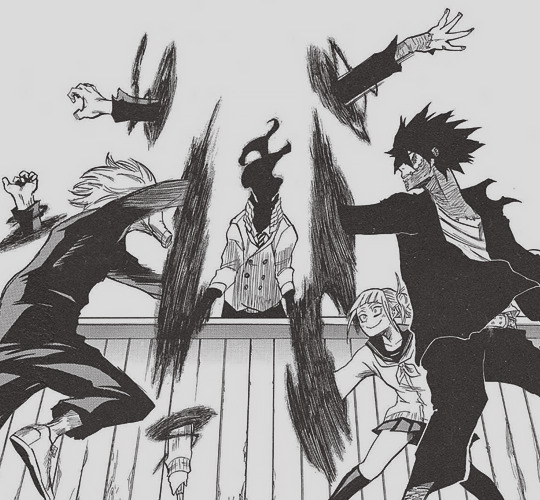
All the way back in the aftermath of the Stain Arc, Dabi and Himiko were the first new recruits introduced for the League of Villains. The three of them together, Shigaraki, Dabi, and Himiko are a trio. Effectively the three main characters of the villain side of the story. They are all three of them, traumatized children who were thrown out by society, and are now fighting back against it. They’ve been pushed out further and further until all three of them came to the same conclusion: Heroes are in the way.
Dabi: “There are no true Heroes.”
Shigaraki: “You heroes hurt your own families just to help complete strangers.”
Toga: “You heroes mess everything up.”
All three of them are children screaming the same thing at the heroes, trying to get somebody to listen only to be ignored. Shigaraki, Dabi, Himiko were all driven to become villains because of hero society. They became villains because heroes existed in the first place.
A meta on the villain trio under the cut.
1. Monsters
Shigaraki, Dabi, and Himiko are all introduced to us as monstrous villains who slowly become human over time. Their development is effectively then in reverse of the main heroes. The heroes we sympathize with right away because they’re introduced to us as innocent kids. We see the villains as violent monsters first before the curtain is pulled back and it’s revealed they started out as children all along.
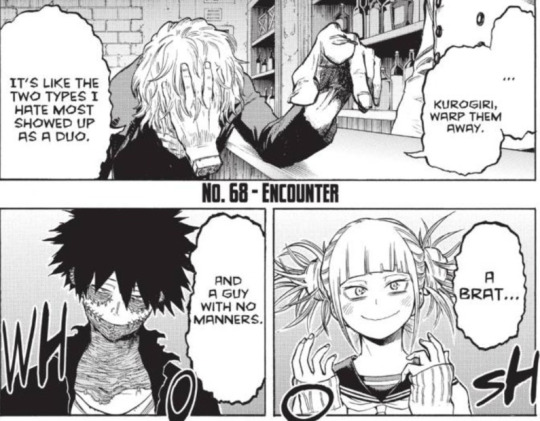
When the three are introduced they have no affection for one another. Shigaraki even calls them “the two types I hate most.” There’s no trust, as the first thing the three do is try to kill each other.
We’re introduced to them at their lowest point. All three of them are in a bad place effectively. Himiko has been on the run for months, Dabi has been who knows where, and Shigaraki has had two successive failures in his attacks on both Stain and USJ.
Their cooperation in the Camp Raid arc is begrudging at best. This goes for the whole league of villains, (Spinner and Magne end up making things harder for each other, Several members get captured) they seem to be working against each other as much as they are working together.
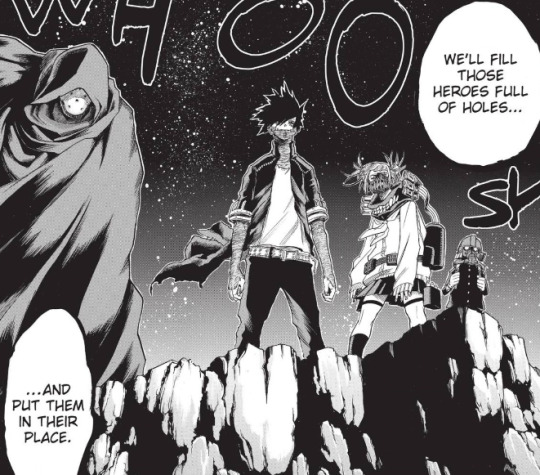
Shigaraki, Dabi and Himiko were all effectively traumatized by the same thing, being cast out from hero society. However, in this arc they all have vastly different desires that make working together difficult. Dabi wants to fulfill Stain’s Will, Shigaraki wants to take down All Might and Hero Society at large to show how fragile it is, Himiko wants to take down Hero Society for the sake of her easier life.
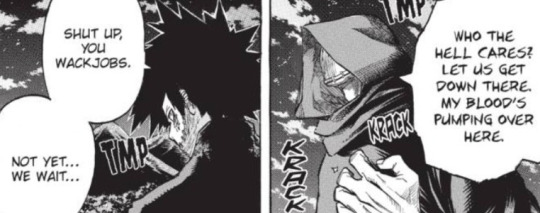
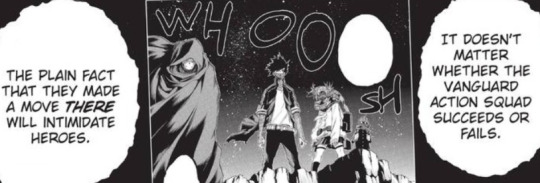
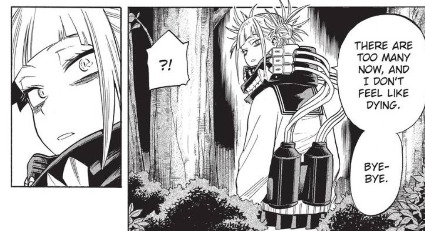
They are not at this point motivated to work together at all and it shows in their cooperation.Dabi doesn’t really make any attempt to lead. Shigaraki just watches from the sidelines and sends out other people on a mission where he doesn’t really care much if they succeed or fail. Himiko doesn’t try that hard to complete her mission objective because at this point all she cares about is her own survival.
However after the defeat of All for One, the league of villains ends up all experiencing the same traumatizing loss together. They all become disenfranchised, living off of no money, and constantly having to be on the run. They lose all of their resources. However, as a reuslt their bonds with one another are strengthened and they really are working together for the first time.
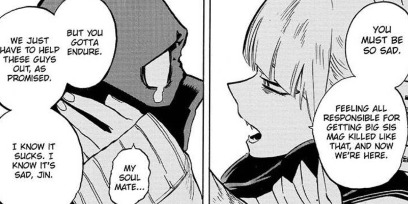
Himiko isn’t just looking out for herself anymore. Not only does she not run away when things get hard, but she encourages Twice to do the same because she empathizes with his feelings.
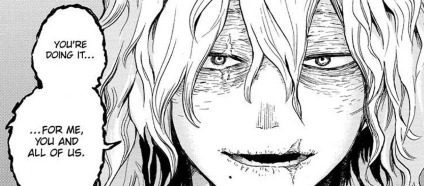
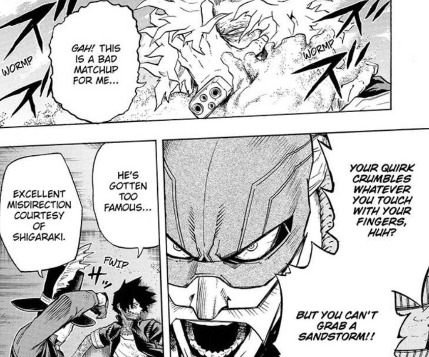
Shigaraki goes from ordering people around in the shadows to not only meeting with his comrades face to face. He also has become the type of fighter who jumps straight into enemy fire on the front line for the sake of his comrades, using his own body as a distraction so he could work together with Compress and Dabi.
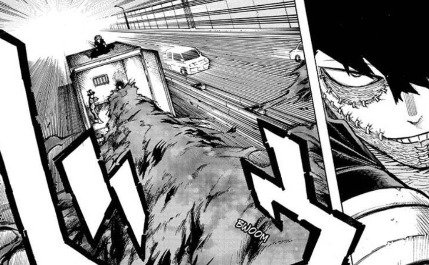
And remember, Dabi’s flames physically destroy his body every time he uses them. Yet, he respects Shigaraki’s leadership enough that he goes all out for the sake of the league when he’s asked to. If Dabi didn’t care about the league at all, he probably wouldn’t be constantly burning himself alive for their sakes.
All three humanize one another through their relationships with each other, Shigaraki values his comrades lives more than his own, Dabi cooperates with other people for the sake of his goal, Himiko’s empathic side began to show all because the three of them were for the first time surrounded by people who were just like them.

When shown empathy and understanding, Dabi, Shigaraki and Himiko all improve as people. They are not lost causes the plot has shown us the opposite, they’re capable of growing and changing. However, they are just as capable of GETTING WORSE.
2. Bad Children
Shigaraki, Himiko and Dabi all share the same origin. They were pushed to become villains because of what happened to them as children. They are the only three members of the league who have been shown as children, deliberately so, because the fact that this happened to them as children is what is so important to their narratives.
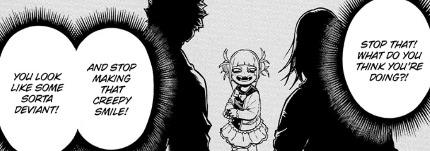



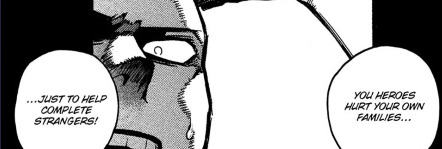

Himiko was born with a weird quirk, and that was it. She didn’t even show problematic behavior that far off of most children (most children don’t have the empathy to know that say, small animals will suffer pain if you hurt them) before her parents started to punish her. Tenko just wanted to be a hero and had a father with a grudge against heros when his punishment started. When he was in the streets begging for help the only thing he was guilty of was having a quirk that activated on accident. Touya was bred by his father for the purpose of his quirk, and because of that had to grow up in a household where his mother was constantly crying and his father either ignored him as a failed experiment, or paid attention to him which would have made his life even worse.
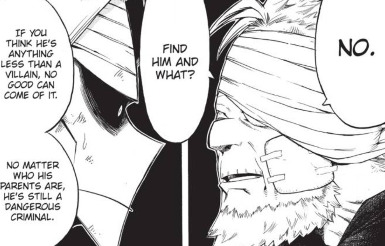
It’s not just a sad backstory for all three of them, it’s a case of systemic failure. Systems that should have protected them did not. The reason we’re shown this happening to them when they were children before they did anything wrong was that the narrative most heroes have is villains choose to be evil and there’s no helping it.
However, this happened to Dabi, Shigaraki and Himiko through no choice of their own. They were all helpless children when they survived these circumstances. The argument that “They could have tried to endure and become heroes” doesn’t work either, because all three of them did try to endure.
They all at one time or another made an attempt to be good children. They tried to reach their parent’s expectations for them. They tried to swallow up the abuse that was hurled on them and live with other people.


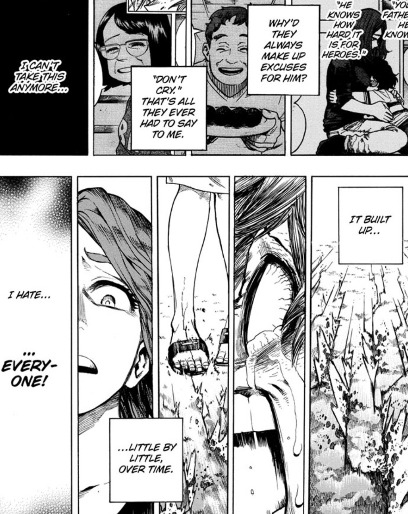
They were all children who were being abused, and told to just go on with their lives, told not to cry, told to suck it up. Instead of trying to fix or even address the circumstances of their abuse all of their pain was effectively ignored. Shigaraki, Himiko, being children DID TRY to live exactly as the adults told them to. They tried to be “Good Children” under the standards of adults, and they couldn’t be.
That’s the reality of living in an abusive household like the one Tenko grew up in. No matter what he had done, he would have been punished. He was the problem child, the scapegoat for his father’s abuse. Rather than tell the father to stop abusing the child, the child is held responsible for the behavior and told that they were at fault for provoking punishment.
Before you use Shoto as an example of still wanting to be a hero after enduring abuse, here’s the difference. Shoto didn’t die. Touya did.
All three of them were cast out before they did anything wrong. Are they still responsible for the choices they made as adults? Yes. However, I think it’s important to acknowledge that all three of these characters did attempt to try making the right choices and they still got cast out anyway. It’s not because they were good or bad children. It’s because society was designed to reject people like them.
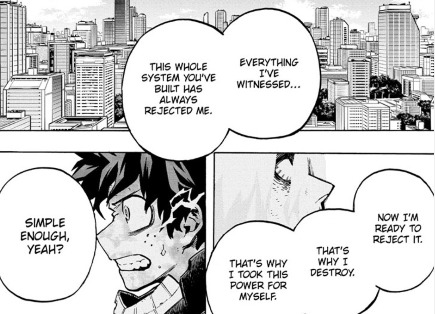
RHA TRANSLATION: That’s how the muck gets cast out. That’s how they break and retaliate. That’s how it loops back, again, and again, and again.
The translations are radically different this week I’m not sure which one is right, but they are vaguely talking about the same cycle. Shigaraki, Dabi, Himiko were rejected before they did anything wrong. They were forced to endure all of this as children. They gained power to survive and began to fight back. They retaliated against the violence done to them as children as adults. Then, they are punished again.
It is a cycle where both people are acting badly. Shigaraki, Himiko, and Dabi drag innocent people into the conflict, because all they can think of to wake people up to the reality of their suffering is to make them endure the same. To show the world the violence they’ve endured on a mass scale, until it becomes impossible for those who are sheltered and protected by society, those who are saved to ignore the problems of those who aren’t saved. Shigaraki, Dabi and Himiko get innocent people involved it’s true.
HOWEVER. Were they not innocents at any point? Were they not just children who had not done anything wrong?
And we return to the Tenko household. Shigaraki, Himiko, Dabi are all responsible for their violent reactions to the problem, that was the choice they made. However, they weren’t the ones who created the situation in the first place.
Villains are held as responsible for all of society’s ills. We are told by heroes that villains choose to become evil, and that the only way to stop them is to violently suppress their activities. However all of these villains for the most part, are outcasts who hold no real power in society, and all have yes made choices to retaliate violently but were also pushed into those choices.
The society around them is designed to exclude people like Shigaraki, Himiko and Dabi. THE PROBLEM ELEMENT, is ignored rather than addressed.
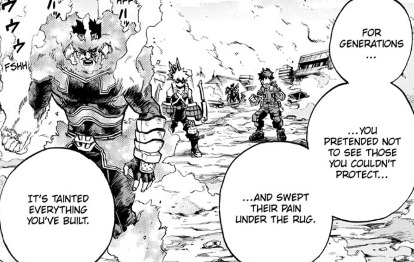
What Shigaraki is saying here is that heroes don’t protect the people most in need of their protection, the biggest victims. They are designed to protect a status quo.
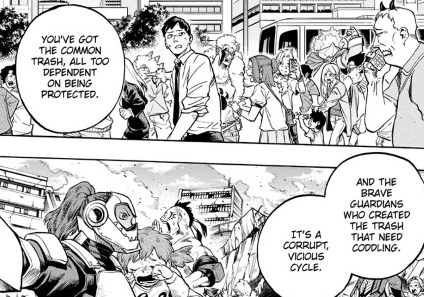
Heroes protect the institutions that are already in place, no matter how cracked or flawed those institutions are. they keep them in place. They are fighting to preserve a power structure that keeps heroes in power. The ones who have the power in society are the heroes. The ones who create society are the heroes. The ones who create the situation are the heroes. The villains in MHA are reacting to the problem, but they didn’t create the problem.
3. Twice
Dabi, Shigaraki and Himiko all have an incredibly important relationship to Twice. Dabi shows up to try to save Twice, even though he states he doesn’t care about the league. Himiko opens up to Twice and empathizes with him. Shigaraki goes to save Giran because Twice asked him to, and opened up to his team for the first time because of Twice’s begging and pleas.
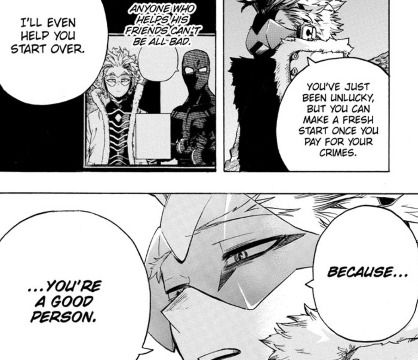
The scene we see play out with Twice is what happened to Shigaraki, Himiko and Dabi as well. Twice is given an impossible choice. He can conform and sacrifice all of his friends to go with Hawks, or he can die right here. Once again, yes it is a choice. I must emphasize everything is a choice. The choice to retaliate is still a choice even if it’s influenced by the environment. However, this is a choice effectively made with a gun to Twice’s head.
What’s interesting is, when given the choice between betraying the people closest to him or getting shot in the head. Twice chooses to take the bullet.
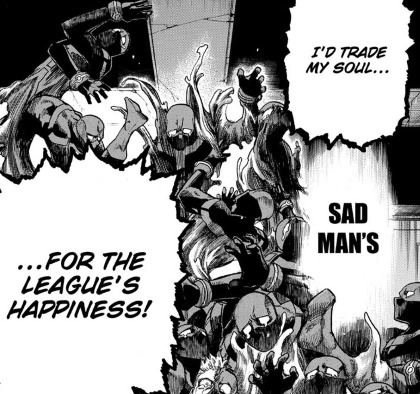
As I said everything is a choice. Even an influenced choice is a choice. If someone is holding a gun to your head, you can just choose to die. You might be stuck in a situation where there are only bad choices, but it’s still a choice you make.
I emphasize choices over and over again, because somebody chose to make the world this way.
They exist in a system where villains are held accountable for all of their violence, their choices, and heroes are not. Heroes can effectively get away with murder as we’ve been shown with Hawks and Tokoyami.
I’d also like to emphasize that the villains make these choices while directly facing all of the flaws of society. The heroes for the most part are completely ignorant to the suffering of villains. We are shown this ignorance again and again. The villains attempt to explain themselves, their motivations and reasonings, and every time they are literally ignored.
Heroes and Villains both make choices, but Heroes are completely blind to their own faults. When they are told about the cracks of society by people who have lived through that, they effectively ignore the role they had to play in it. Twice tries to explain he can’t betray his friends to Hawks, that they’re all capable of being good people and he gets ignored. Shigaraki explains to Endeavor that his father told him heroes hurt their own families, he gets ignored. Endeavor’s case is especially EGREGIOUS. Endeavor who should be more aware of his own flaws than anybody else, still pretends to be the perfect faultless hero.
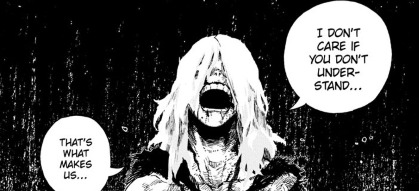
Heroes and Villains are both responsible for creating this flawed world, but the villains are held responsible, and the heroes are not. Heroes are given special privilege in society, Villains are mostly made up by the underprivileged and cast out. Society, is intentionally designed to divide up people like this and categorize one over the other.
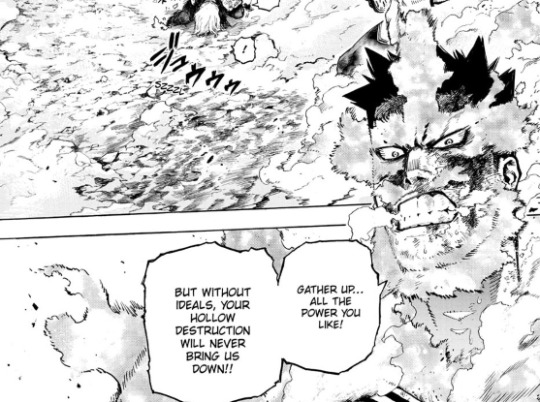
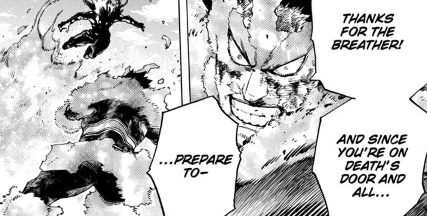
And I think it’s especially important that every time Shigaraki tries to get someone to listen to him he gets told the same thing. Endeavor believes he is a good person fighting to protect others. He claims that he is the hero, fighting against someone who only hollowly wishes to destroy. Shigaraki tries to explain himself, he even makes a reference to familial abuse which Endeavor SHOULD RECOGNIZE and Endeavor’s response is to tell him to shut up and die.
Shigaraki, Dabi, and Himiko are wrong for violently retaliating, but every time they make any attempt to explain themselves they’re rejected just as violently. They are told, like they were when they were just children, to just shut up and take it. Shigaraki is told by Nana, Endeavor, Gran Torino everyone around him to die rather than fight back, is it no wonder he believes the whole system rejects him?
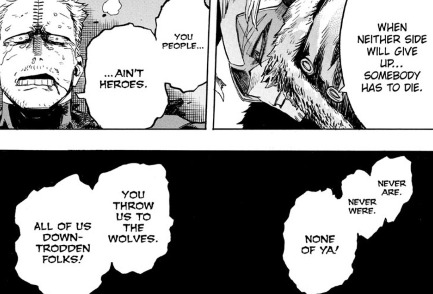
It is an unfair system to begin with, deliberately designed to uplift a few people into privilege and cast others out.
Heroes act like the few people who don’t get saved are just bad luck, but it’s not. Good social programs would have saved Twice. Social services would have saved Himiko. All Might realizing Endeavor was an abusive jerk would have saved Touya. If Gran Torino had checked up on Nana’s child, Shigaraki would not have happened.
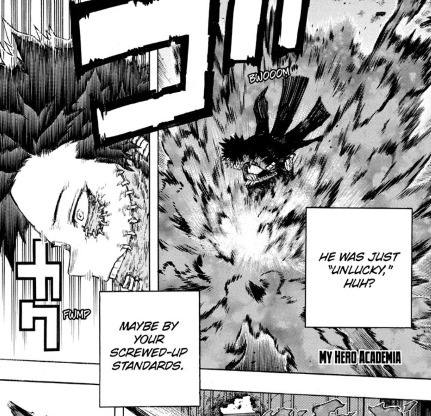
All of these kids “just got unlucky” except the society they live in was designed to outcast certain people like them from the start. It’s meant to let people fall through the cracks. In each case it wasn’t bad luck, but rather intentional neglect of all parties involved.
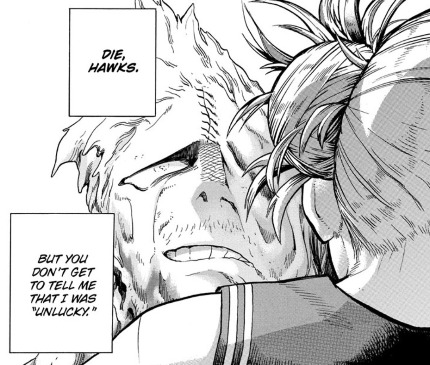
Twice is told what happened to him was bad luck, but Twice didn’t slip and fall on a knife. He was put into the situation intentionally by Hawks. Hawks singled him out, targeted him, pushed him to the breaking point, and then killed him. The one who had power and the upper hand in that situation was Hawks from the start, but Twice is blamed for his own death for merely fighting back.
The connection between Shigaraki, Dabi, and Himiko is that they’re pushed to become more and more radical over time. Himiko had killed a few people yeah, but she wasn’t a terrorist on a mass scale.
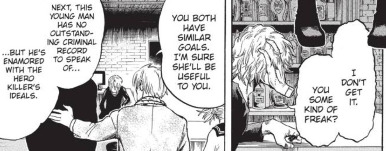
Dabi had no criminal record when he started. He only started killing people to make the news when his father became the number one hero. The more they are rejected, the more radical they become.
All three of them have become radicalized by the death of Twice, and all three say effectively the same thing.
Dabi: “There are no true Heroes.”
Shigaraki: “You heroes hurt your own families just to help complete strangers.”
Toga: “You heroes mess everything up.”
Why do they blame heroes? It’s because heroes are the guardians of the society that rejects them. Heroes do not protect people, they protect systems and structures first and foremost. The heroes aren’t coming to save them and they never were.
#shigaraki tomura#himiko toga#dabi#todoroki touya#shimura tenko#league of villains meta#shigaraki meta#dabi meta#himiko meta#lov meta#mha meta#my hero academia meta#my hero academia theory#bnha 281#bnha 281 spoilers#mha 281#mha 281 spoilers
1K notes
·
View notes
Note
Would you consider Hugo Strange a pulp villain?
Yes. And I would argue that he didn't really stop being one even after his revival.
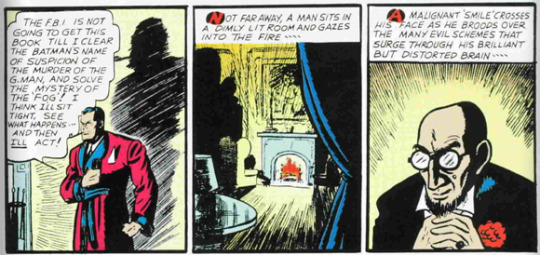
"Professor Hugo Strange, the most dangerous man in the world! Scientist, philosopher and a criminal genius - little is known of him, yet this man is undoubtly the greatest organizer of crime in the world! - Bruce Wayne, Detective Comics #36
Hugo Strange was created with the intention of being Batman's arch-enemy right from the start, introduced as such by Bruce when he figures out he's responsible for the G-man assassination, pretty explicitly intended to be Batman's Moriarty and with even an equivalent demise. He was big enough to tower over his henchmen and fistfight Batman, he had a uniquely deformed skull, he was both a charismatic but threatening crimelord as well as a mad scientist plotting to TAKE OVER THE WORLD, and I've heard before the argument that the Monster Men were taken from a Doc Savage novel released earlier the same year called The World's Fair Goblin that revolves around a giant mutated man doing crimes under command by the story's villain
That poor devil, Maximus, was a Fair visitor himself, once. He was given injections of thyroxine and adrenalin—and changed rapidly into a pituitary giant. But, in the experiment, his will power was destroyed. Now he only follows the directions of that masked devil who has him hypnotized
He said, "The Man of Tomorrow stuff was merely publicity to draw the Fair crowds—and a shield to cover your own experiments. But the masked surgeon cashed in on it. Obviously he is mad enough to really believe a superman can be created." - The World's Fair Goblin
(Considering Lester Dent had taken potshots at Superman explicitly in "Whisker of Hercules", it's not unlikely that this is an explicit reference)
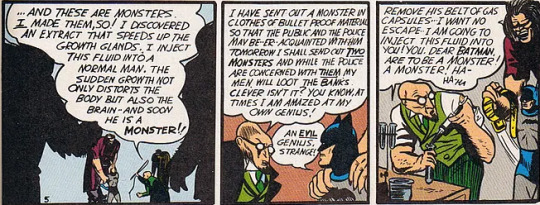
Although there's really no overlap in the stories besides that, as The World's Fair Goblin only had one giant where as Hugo mutated a couple dozen mentally ill patients to create monsters and then used them to go on mass murdering rampages, because Batman has always been over-the-top. But, yeah, original form Hugo was a pretty cut and dry pulp villain, like most of Batman's villains who debuted prior to 1940. Which is part of why he only had about 3 appearences before they killed him off.
By this point, Batman was in the process of moving away from his pulp knock-off origins into more of his own character, with the introduction of Robin and Dick Tracy cartoon villains that would set the tone for the rest of Batman in the Golden Age, and with the debut of Joker and Catwoman in Batman #1, Hugo was already obsolete as an arch-enemy, and was killed off the following appearence.
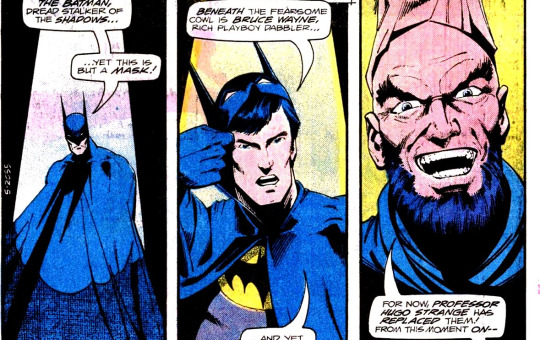
Of course, if you know Hugo Strange, you likely already know this, and that he was then revived in the 70s by Marshall Rogers with a brilliant take that stuck to the character's origins as a brilliant crimelord and scientific genius, but also added to him a specifically twisted psychological bent of being obsessed with Batman and becoming Batman, a villain of unshakeable will and even a twisted sense of honor and ethics, refusing to divulge Batman's secret identity even while beaten to death.
And from that moment onwards Hugo would go on to have some of the most consistently brilliant appearences out of any Batman villain (at least until the 2010s) and would secure himself as a mainstay, albeit a very obscure one, figure of Batman, the kind of villain whose plots can range from Born Again-esque subtle destructions of a person's life to a rampage of mutant kaijus on downtown Gotham, and like many of the best Batman villains, it all comes back to a central obsession and psychological edge upon Batman, and the weaponizing and destruction of anything that stands in his way.
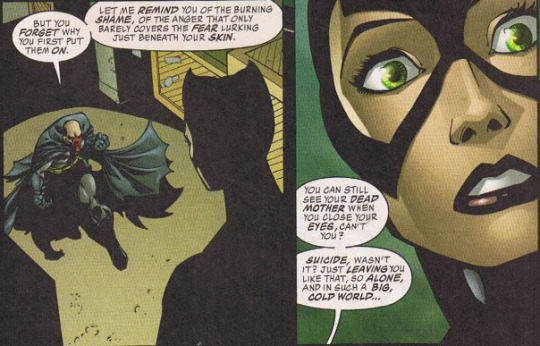
You could argue Hugo Strange used to be a cut and dry pulp villain who was eventually reimagined as a Batman Villain, and it would even be somewhat fitting of his in-universe trajectory as a man who started out a career as a figure of prestige and respect, effortlessly able to blend in society, until his repeated encounters with Batman and, most importantly, his gradually increasing obsession with becoming Batman, gradually destroyed him until he's no longer the one ruling the madhouse, but instead trapped in it.
But the reason why I'd argue Hugo Strange is still a Pulp Villain is because his reinventions didn't shed away what he used to be, they merely returned him to his true origins. Because Hugo, you see, is not just a Mad Scientist or Mad Psychologist, Batman's got those by the dozens. Hugo is of a particularly nasty kind of Pulp Villain, who came to existence around the same time as the Mad Scientist if not slightly earlier, an archetype Jess Nevins has named The Evil Surgeon
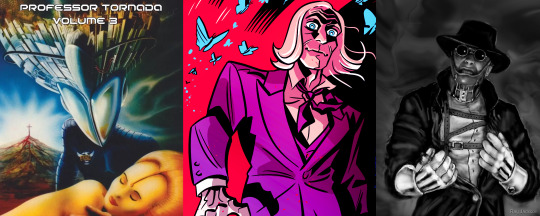
Medicine has arguably thrown up more serial killers than all the other professions put together, with nursing a close second - Herbert Kinnel, former chairman of the British Medical Association
The Evil Surgeon came to existence as a pop culture archetype in the late 19th century, as the result of serial killers like Jack the Ripper and H.H Holmes making the news, with Doctor Quartz from Nick Carter being first and foremost among these, as the main arch-enemy of the most published character worldwide at the time.
He would be followed years later by H.G Wells's Doctor Moreau, and the likes of Dr Caresco and Professor Tornada, the stars of novels created by André Couvreur, who was himself a medical doctor and used these novels to both condemn the characters as well as give serious consideration to the ideas they explored, and depicted Dr Caresco's over-the-top exploits harkening back to stories about Marquis de Sade (the origin of the term "sadist"). These would be followed by characters like Grigorii Trirodov, Dr Cornelius Kramm, Dr Gogol from Mad Love, currently the most famous example of this seems to be Hannibal Lecter. And Hugo has been operating much more along the lines of those characters in the last decades, than the typical mad scientists he was once designed in reference to.

Of course there's a massive overlap between the two and room to dispute whether they even constitute separate archetypes, they practically came to existence together following the footsteps of Victor Frankenstein, who really isn't a true example of a Mad Scientist in the original novel, and wasn't even a real doctor, but Frankenstein's reputation undeniably is the oldest cultural touchstone we can point to as an influence in the archetype, even if said archetype would only truly take form in pulp magazines and serials.
What I'd argue defines the Evil Surgeon as an archetype specifically, is that they are specifically centered around the violation and destruction of the human body and function more as murderers with budgets, than supervillains in labcoats. Mad Scientists are generally more centered around plots closer to sci-fi/fantasy inventions like sentient robots and immortality potions used for large scale global domination, where as Evil Surgeons are more preoccupied with wielding psychology and torture and criminal resources to get away with destroying minds on more individual scales, or turning cities into slaughterhouses for them to work in.
They aren't quite full blown slasher villains, like Zsasz or Professor Pyg, instead they usually tend to be quite good at passing off as respectable, mentally sound figures of moral standing, and usually possess a sense of purpose towards their work, a goal they are working for by piling corpses atop each other and moving resources to achieve, even if said goal is a purely selfish fulfillment of their own desires. It's quite common for these characters to acquire large bases for them to operate in, even islands specifically.
In Caresco Surhomme, Caresco has taken control of the Pacific island of Eucrasia. Caresco applies his surgical methods to the inhabitants of the island, altering them to better do their jobs. The captain of the plane which brings outsiders to Eucrasia is a limbless trunk with telescopic vision. Even the island itself is in the shape of a human body. The natives of Eucrasia are addicted to various sensual pleasures and generally submit to Caresco’s rule, for fear that he will castrate them or worse.
On Eucrasia, Caresco makes use of “omnium,” a mysterious and unexplained power source, to create: a machine capable of stripping the years from human bodies and reversing the aging process, a fast underground train system, food pills, omnium-powered diving suits, and so on. Caresco is given to such things as collecting the spleens of all those he operates on - Jess Nevins, The Encyclopedia of Pulp Heroes
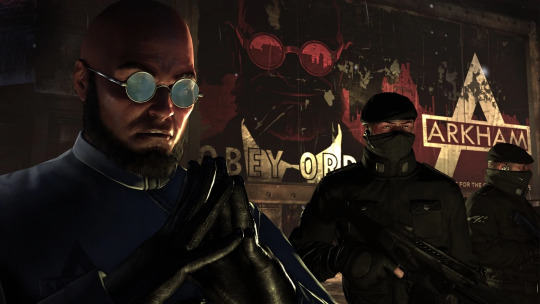
So, yes, I absolutely would argue Hugo Strange is still a Pulp Villain. Pulp villains do come in many different forms other than the Fu Manchus and Fantomases that are most commonly imitated, pulp was the breeding ground of the supervillain as a concept after all, where they got to star in their own magazines time and time again. Hugo started off as a fairly generic one, and when he's written poorly, he tends to be brought onboard of a story purely because it calls for a mad scientist.
But Strange came back from death as something much, much worse than just a crimelord and mad scientist, a much more rare and much nastier type of villain that, much like Hugo himself, may lie dormant, but refuses to stay dead for long.
"Quincy. My servant. My friend," Hugo said. "We don't have much time."
Quincy was crying again, with joy. "How, master, how did you-?"
The therapy, Quincy realized. The hypnosis. The drugs.
"Stay with me master, please!" Quincy tried to grab hold a phantom hand.
"I cannot." Strange said, looking benevolently down at Quincy, stroking his hair with a touch the prisoner couldn't feel. "But there is one last service you can perform me."
"Anything, Hugo, please."
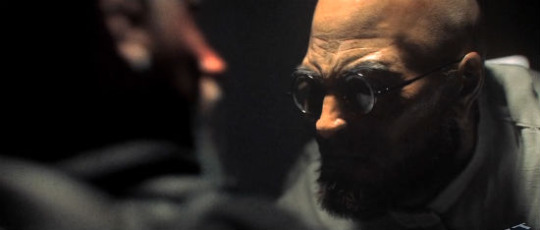
"First, remove the sheet from your bed, Quincy. And tie it to the light-fixture on the ceiling."
38 notes
·
View notes
Note
When people say Sansa being tied to power will be miserable for her , they mean she will live her life in a cottage far away from her home and not be a threat to other characters. The game Sansa is wary of is the Littlefinger style of "Game of Thrones" which is based on lies and treachery. Even Ned disliked playing the game and power was suddenly thrusted upon him when all his life he was groomed to follow. At the end, Ned does a decent job and by ADWD, it's his legacy that is shining . Most of these arguments about Sansa not ending up in a position of power , are coupled with the idea of "she will never go north and will meet their favourite pedo and live with him for eternity ".
I don’t even know. I don’t care what motivates them. It’s simply wrong.
The thing is, the lemon cake quote the anon used actually proves the opposite of what they wanted to say, when used in context. Sansa IS interested in this stuff.
Ned is holding court as Hand of the King and notices her up on the gallery watching - and is pissed!
From his vantage point atop the throne, he could see men slipping out the door at the far end of the hall. Hares going to ground, he supposed … or rats off to nibble the queen’s cheese. He caught a glimpse of Septa Mordane in the gallery, with his daughter Sansa beside her. Ned felt a flash of anger; this was no place for a girl. But the septa could not have known that today’s court would be anything but the usual tedious business of hearing petitions, settling disputes between rival holdfasts, and adjudicating the placement of boundary stones.
(AGOT, Eddard XI)
Followed by Sansa III, which is all about Sansa telling Jeyne what went on in the throne room in great detail and with much enthusiasm. Because - even if it is still colored by her idealised notions of chivalry - she cares about this sort of stuff.
“He wouldn’t send Ser Loras,” Sansa told Jeyne Poole that night as they shared a cold supper by lamplight. “I think it was because of his leg.”
Lord Eddard had taken his supper in his bedchamber with Alyn, Harwin, and Vayon Poole, the better to rest his broken leg, and Septa Mordane had complained of sore feet after standing in the gallery all day. Arya was supposed to join them, but she was late coming back from her dancing lesson.
“His leg?” Jeyne said uncertainly. She was a pretty, dark-haired girl of Sansa’s own age. “Did Ser Loras hurt his leg?”
“Not his leg,” Sansa said, nibbling delicately at a chicken leg. “Father’s leg, silly. It hurts him ever so much, it makes him cross. Otherwise I’m certain he would have sent Ser Loras.”
Her father’s decision still bewildered her. When the Knight of Flowers had spoken up, she’d been sure she was about to see one of Old Nan’s stories come to life. Ser Gregor was the monster and Ser Loras the true hero who would slay him. He even looked a true hero, so slim and beautiful, with golden roses around his slender waist and his rich brown hair tumbling down into his eyes. And then Father had refused him! It had upset her more than she could tell. She had said as much to Septa Mordane as they descended the stairs from the gallery, but the septa had only told her it was not her place to question her lord father’s decisions.
(AGOT, Sansa III)
She went there on purpose to watch, not knowing it would get exciting, she stayed there ALL DAY and then she thought about his various decisions and spent the evening telling Jeyne about them.
Yeah, she hates the intricacies of ruling. Not.
Arya has different priorities. Both in how she spends her time (”dancing”), and in what kind of interaction she prefers:
Back at Winterfell, they had eaten in the Great Hall almost half the time. Her father used to say that a lord needed to eat with his men, if he hoped to keep them. "Know the men who follow you," she heard him tell Robb once, "and let them know you. Don't ask your men to die for a stranger." At Winterfell, he always had an extra seat set at his own table, and every day a different man would be asked to join him. One night it would be Vayon Poole, and the talk would be coppers and bread stores and servants. The next time it would be Mikken, and her father would listen to him go on about armor and swords and how hot a forge should be and the best way to temper steel. Another day it might be Hullen with his endless horse talk, or Septon Chayle from the library, or Jory, or Ser Rodrik, or even Old Nan with her stories.
Arya had loved nothing better than to sit at her father's table and listen to them talk. She had loved listening to the men on the benches too; to freeriders tough as leather, courtly knights and bold young squires, grizzled old men-at-arms. She used to throw snowballs at them and help them steal pies from the kitchen. Their wives gave her scones and she invented names for their babies and played monsters-and-maidens and hide-the-treasure and come-into-my-castle with their children. Fat Tom used to call her "Arya Underfoot," because he said that was where she always was. She'd liked that a lot better than "Arya Horseface."
(AGOT, Arya II)
Arya prefers a more equal connection, an immersion in the people of the household. She wants to know them all and she gets into their business, the setting she prefers is semi-private and personal, related to practical details and bonding, not the formal exercise of power involving thoughtful political decision-making on a much larger scale.
So when Jeyne keeps interrupting Sansa, it is irritating because Sansa cares and the only thing that can mitigate it is the cause of the interruption: friggin’ lemon cakes. Alayne Stone bankrupted the entire Vale of lemons for a lemon cake. That’s the scale of how much they mean to her.
Jeyne yawned. “Are there any lemon cakes?”
Sansa did not like being interrupted, but she had to admit, lemon cakes sounded more interesting than most of what had gone on in the throne room. “Let’s see,” she said.
The kitchen yielded no lemon cakes, but they did find half of a cold strawberry pie, and that was almost as good. They ate it on the tower steps, giggling and gossiping and sharing secrets, and Sansa went to bed that night feeling almost as wicked as Arya.
The next morning she woke before first light and crept sleepily to her window to watch Lord Beric form up his men.
She still makes sure to follow up the proceedings of the court day by watching Beric ride off before dawn even though she stayed up late.
Are her thoughts about what goes on still immature? Yes, she is a 12-year-old girl. But she IS interested, she had the patience to listen to this stuff for hours and recalled the details with enough enthusiasm and clarity to nerd off about it to Jeyne, who clearly could not have given less of a flying horse shoe. That boring crap even Jeyne can’t bear to listen to? Sansa lives for it.
The idea that Sansa would be, specifically, miserable in this setting is simply fiction. The idea that Arya wouldn’t be is also a stretch.
Can and should they learn from each other? Yessss. Sansa would definitely benefit from more contact with the smallfolk. Arya’s strength there is something Sansa needs to emulate.
Does that mean their personal inclination for what they enjoy would change? No. In a formal courtly rulership position, Sansa is likely to thrive.
80 notes
·
View notes
Text
Why Sylive did the right thing
So I'm going to say something that I feel like not enough people are saying. Sylvie did the right thing in creating the multiverse. The entire argument against creating the multiverse is predicated on He Who Remain's claim that there are worse versions of him out there, and he is the best possible solution.
To make this easier, I'm going to refer to variants of He Who Remains, as Kangs, and only use He Who Remains when I'm specifically talking about the person we meant in episode 6. So let's talk about all those Kangs. So the first thing we have to ask is, can there, in fact, be a worse Kang than He Who Remains?
I'd say no. Think about it. He Who Remains destroyed every timeline but one. He literally fed every person who ever lived and ever would live to Alioth millions of times over. It's mass murder on an incredible scale. He argues that without what he did, all of reality would be destroyed. That one surviving reality is better than the destruction of everything.
But as far as we know, none of the Kangs want to destroy all of reality. If one of them did, presumably enough of the others would band together to stop him. We are told they are capable of working together, in the same way, that some Loki's can get along, while others fall into ridiculous circles of betrayal.
So what do the other Kangs want? From the comics, we know Kang the Conqueror wants to rule over the multiverse. Compared to the alternative, that is not so terrible because He Who Remains already does rule over everything, except he's forcing people to live in one reality without choice. In the single Universe created by He Who Remains, there is no free will. No one can do anything that He Who Remains does not allow. If they do, the TVA prunes them, and they get fed to Alioth. That is absolute tyranny. At least in a multiverse ruled by a Kang, people would still be able to make choices.
Also, He Who Remains' timeline is limited. It ends. We see it, and it's a circle that loops back in on itself, and I suspect that's not natural. Yes, it seems fair to assume that eventually, time and the Universe will end, but consider what we hear about the future from the TVA. The Time Keepers are supposedly in the process of writing the future. We know the TVA tells all sorts of lies, but also they are time travelers. Clearly, they can't see the heat death of the Universe (or however else it might end). There's a point in time they can't travel past. Otherwise, they would not need to talk about an unwritten future.
So why does time seem to stop at a point where the Universe seems like it should continue? And when is that point? I think it has to be either when He Who Remains was born or at least sometime early in his life. Why? Well, any Kang born in He Who Remains Universe has to be a variant. This Kang could live his life exactly as He Who Remains did, until the point when He Who Remains discovered the multiverse because there is no multiverse to discover. And if this new Kang figured that out, sooner or later, he would find out about He Who Remains, and then trouble would begin all over again.
So time has to stop at some point. Even if He Who Remains were to actively prune himself before he could discover the lack of a multiverse, he has to make sure that no one else can ever discover it either. That's why there can be a Void at the End of Time. That's why we see the timeline in a loop around the Citadel, and why He Who Remains shows us the multiverse as a series of rings.
So He Who Remains has to stop time at a certain point. He has to destroy the future of the Universe. He isn't just controlling everything; in reality, he also destroys it, but without the opportunity for a new reality to rise up afterward.
But surely the other Kangs are worse, right? I mean, we know one of them is building giant statues of himself. Maybe the other Kangs are more arrogant. Perhaps some of them enjoy being cruel. He Who Remains is kind of endearing in a crazy 'I've been locked in my room for too long' kind of way. I suspect when we do see Kang, he will not be so friendly.
But that doesn't mean the other Kangs are worse. We don't know which Kang began the multiverse war; we only know which one ended it, and he did it in the most bloody way possible. He Who Remains is also very patronizing. He clearly believes that people can't be trusted with free will, but that's because he doesn't trust himself with it.
The cause of the multiverse war is Kang. He is the problem. Some of him can't get along with others of him, and they create a dangerous war over it. I'm sure other people get pulled into this war; that's how wars work, and if you were being invaded by another reality, why wouldn't you fight back?
But wars happen, and they end. He Who Remains believes the only possible end can be his solution or all of reality being destroyed. He believes he is inevitable.
But, you might say, wars hurt people, lots of people across lots of realities will suffer and die. Yes, probably true, but at least those people were allowed to live and exist before they suffered and died. In the Universe of He Who Remains, those people never got a chance to be happy, fall in love, or even live. Is it really better for entire realities not to have existed at all?
If He Who Remains is right, and he will just be born again, and take over everything all over again, then at least Sylvie has bought the multiverse a chance to breathe. Timelines will once again come into existence, people will once again have free will, at least for a while, until it all ends again.
But what about that Kang who builds statues of himself? We don't know much about his timeline yet, but let's assume it's not just the TVA that knows about him. Let's assume he's set himself up as God, and everyone in all of his reality's time and space knows that Kang is the ruler of the Universe, that he decides everyone's fate.
To be fair, that's probably a more boring timeline, but is it a worse one? First of all, Kang effectively is God; he really does determine what people are allowed to do and sends his TVA to erase them. Which actually isn't any different than what He Who Remains is doing; Kang is just upfront about it. If this Kang wants to be worshiped by all of existence. Well, at least there are no religious wars because there are no different religions; there is only Kang.
It comes down to a matter of personal preference at that point. If you live in a deterministic universe, where you have no control over the choices you make and no ability to change your life for the better, are you happier off knowing that or not knowing it?
Personally, I would rather know. I would rather know that my mistakes were not my fault because I just wasn't allowed to do better. I wouldn't have to feel guilty or bad about anything I did because I had no choice in doing any of it.
Other people might prefer not to know. They might prefer the illusion of free will. But whatever you prefer, is one Kang worse than the other? One is more honest but also more arrogant. As I said, the Kang as God-King of the Universe strikes me as more boring because there would not be as much room for art, philosophy, and all kinds of expression as people try to understand the nature of reality.
On the other hand, no ship-wars unless Kang finds them amusing.
Finally, there's the dumb meta reason that Sylvie was right. We know Kang can be stopped. We know there's another solution to the multiverse and that all reality in the MCU isn't going to end because Disney is going to keep making more content. Yeah, Sylvie and Loki and can't know that, but it's a question of whether they believe the Universe deserves the chance to prove itself better than Kang or if enslavement is its only option.
21 notes
·
View notes
Text
look me up and define me (please remind me) (part 1/2)
He is whatever puts Thomas first. But that changes so often that he doesn’t know what he is beyond that.
He is Janus when he is alone, but only when he is not someone else.
Janus has never minded the fact that his identity is fluid, ever-changing. He acts as whoever Thomas needs him to be in the moment, and if that means he doesn't know much about himself as an individual, well. It's never been a problem for him.
Until he gives away his name, and then it very much is.
Chapter Warnings: identity issues, non-graphic panic attack, references to self-harm
Chapter Word Count: 4,493
Pairings: platonic TDLAMPR, implied Moceit (though you don’t have to read into it)
Notes: This fic started as a oneshot but ended up being more than 10k, so I’m dividing it into two parts, the second of which will hopefully be posted Friday. Also, this fic as a whole was inspired by the awesome ‘The Record Player Song’ animatic by @turbovickii, which, 10/10 would recommend if you haven’t seen it
Chapter one podfic by @titheinironside
(part 2)
(masterpost w/ ao3 links)
Janus isn’t his name.
Or rather, it isn’t, and it is. He’s never had to think too hard about it before, has never had to struggle for the words to put it all into context. Janus is his name, yes, the name he chose for himself back when Thomas was young and they were all bright-eyed, foolish children, and his preferred moniker wasn’t Deceit but rather something entirely different.
Janus. Roman god of beginnings and of ends, of transitions, of doorways, of passages that lead on and on. God of time, and god of duality. He thought it a fitting descriptor for himself; he is sweet lies, lies that soothe and lies that heal, and he is bitter truths, truths that no one wants to hear, that he must keep to himself lest they do more harm than any lie could. If that is not duality, he doesn’t know what is.
But he is, at his core, whatever Thomas needs him to be. He is fluid in a way that the others are not, able to shift and change depending on the day, depending on what Thomas requires of him at any given moment. He is Thomas’ ability to lie, but only when it benefits him; when a truth would do the most good, he suggests that, instead. He wants Thomas to succeed, to do whatever it takes to better himself, to pursue his ambitions, but only until he pushes himself too far, works himself into exhaustion or questions himself too much. Then, he is the voice that tells him to relax, to take time for himself, to put his health above his goals.
He is whatever puts Thomas first. But that changes so often that he doesn’t know what he is beyond that.
He plays the part of the others, too, whenever it is necessary. They are used to it by now, so used to it that by the time he reveals himself to Thomas, they react with anger rather than surprise or alarm. But what they do not know is that for every time they catch him out, there are five more times he goes undetected, slipping in amongst them, a snake in the grass. He mediates arguments as Morality when the real Patton is nowhere to be found, uses Logic to pull them down to earth when Logan is too buried in his books and theories to realize there’s an emotional problem, uses Creativity’s bravado to advocate for Thomas’ dreams when Roman is busy dreaming himself.
He keeps the mindscape running smoothly. And when he is not one of them, when he wears his default skin, scales and all, he is known to them as Deceit. Nothing more, nothing less. A convenient villain, uniting them all in their distaste. It makes him sick, sometimes, their naivety, the knowledge that without him here, they would run Thomas into the ground all while professing their love for him. But he swallows it down, hides it within himself with all the other truths he hoards, and he carries on another day.
He is Janus when he is alone.
But even that is not true, not really. He is Janus in the snatched moments he has for himself, when there is no pressing crisis, nothing for Thomas to be doing or saying or making, when he can sit alone in his room with the jukebox crooning soft melodies. He is Janus, but only sometimes, because even alone, he draws on the traits of the others. Logan, when he needs a clearer perspective; Roman, when he needs an ego boost; Virgil, to indulge in his worries; Remus, to indulge in darker thoughts; Patton, when he is feeling weak and lonely and wanting, when he wraps his arms around himself and wants to pretend that he does not stand in solitude.
He is Janus when he is alone, but only when he is not someone else.
The Roman god Janus has two faces, one to look to the past and the other to the future. None to look to the present, and that is how he feels, most days, like there is none of him-as-Janus present at all, like every face that he wears is a false one, and his namesake has only two but he has far more than that.
He’s not sure he even knows who Janus is, besides the name, what he likes and what he dislikes, how he feels and how he acts when there is no pressure on him to keep Thomas well. He likes chess and philosophy, but he only ever plays as Logan, only uses that knowledge when he’s wearing the necktie and glasses, because otherwise he can’t get anyone else to listen. He dislikes surprises and stupidity and the ever-present knowledge that nothing in Thomas’ life is guaranteed, due to a society that actively works against most of its members, but are those his concerns or Virgil’s? He only indulges in stronger emotions when he takes Patton’s form, so who’s to say that the feelings are Janus’ at all?
And he almost never gets to act when there is no pressure on him to keep Thomas well. That pressure is always there, has always been there. Without it, who would he be?
In the end, Janus is just a name. Whether it’s his or not is difficult to say. And that has never been a problem for him; he exists to benefit Thomas, after all. He doesn’t feel the need for a solid identity beyond that, not like the others do. He only picks a name in the first place because everyone else does, because Creativity-that-is-Remus needs someone he can look up to, because Anxiety-that-becomes-Virgil needs to know that not everyone is out to get him. It’s a display of trust, in a way, but trust only leads to disaster, to angry two-toned words and pounding footsteps and a blank space in the wall where his best friend once lived, so really, what is the point?
Janus is his name. But he’s not particularly attached to it, and he’s content to leave it there.
But then, there is the callback, and the wedding. But then, he fights for Thomas’ desires harder than he has ever fought before, and when that turns sour, he returns to fight for Thomas’ failing mental health. He does so as Logan, and as Deceit when Logan’s form no longer suits the goal, and he’s not expecting them to listen but he still tries.
But then, everything changes.
But then, Thomas says, I don’t know that we are, and he believes for a moment that he is imagining all of this, that he has slipped into Roman’s face and has allowed a daydream to get just a bit out of hand, because to hear those words out of Thomas’ mouth is something he has fantasized about for so long.
But then, he has a chance at acceptance, a chance to change it all so that he no longer has to struggle to make his voice heard, a chance that all depends on using the right words at this exact moment, and in the split second before he begins to tug his glove from his hand, he panics. Because he is Deceit right now, and the amount of sincerity that he has allowed to spill from his lips has already been taxing. What else can he possibly say to earn their consideration, to earn a place among them?
And then he remembers the importance they place on names. From there, the decision is practically made for him.
He says the words as if on autopilot, an odd mixture of nervous and numb, and he has to check to make sure he has not accidentally shifted into Virgil’s hoodie rather than Deceit’s capelet as his fear thrums though him. Roman laughs, and he lashes out in return, though more due to offense at the idea that the name is stupid rather than because of a personal connection to it.
When Patton says it back to him, he can’t stop himself from flinching, just a bit, can’t stop the widening of his eyes, the stilling of every muscle. He should be glad, he thinks, because this shows that Patton, at least, is willing to give him a chance, is willing to let him in just a little. But all he can feel is a pervasive sense of wrongness, because he isn’t supposed to be Janus here. Here, he is Deceit, is acting as Deceit. Janus is for isolated, personal moments, and for the life of him, he cannot change that, cannot draw out what little he knows of Janus while there are others here, while Thomas is here.
It’s all wrong. And it only gets worse.
Patton wants to spend time with him, after that. Mostly, he’s glad to accept, is glad of the opportunity to endear himself, to cultivate a relationship that once would have been impossible. Patton invites him to bake, to watch movies, to play games, even to debate morality with him, and he does, and he finds himself enjoying both the activities and the company. But every so often, he catches himself, happiness curdling and souring, because these are all things he enjoys when he is Patton, when he is filling in the cracks that form in Morality’s absence. He has never done any of this as Janus, and every time Patton calls him by the name, he feels dirty, feels like the worst kind of imposter, because in these moments, he doesn’t feel as though he is acting as Janus so much as acting like a reflection of Patton himself, and if Patton knew that, knew that the person he thought he was befriending barely exists at all, he would be devastated.
For some reason, he thinks he would do just about anything to avoid that. For the sake of Thomas’ mental health, surely, and not because he cares about Patton as an individual. To do that would be to open a door that he wouldn’t know how to close. Better to leave it shut and locked, and to ignore the fact that the knob is already turning.
“You okay there, kiddo?” Patton asks him. “You seem a little distracted.”
He manages a smile, and he knows it comes off well, because that is what he is practiced in. “Perfectly fine,” he says. “Sorry about that.” He sniffs the air. “This batch definitely won’t burn if you leave it in any longer.”
And Patton gasps and bustles around, pulling the cookies from the oven, the redirection working perfectly.
Leave it shut and locked? Please. The door is open, he thinks. Perhaps it would be a disservice to both of them to pretend otherwise. Because he finds himself almost unbearably fond of Patton, these days, and guilty for feeling so. As soon as he has a moment alone, he has to shift into Patton’s form to get his emotions under control, to abate the itching tightness of his skin. Deceit isn’t made for these pleasant interactions, and Janus is about as tangible as mist, but he can hardly be Patton in front of Patton, so he wears a mask of scales and speaks past the acid burning in his throat.
The smart thing to do would be to stop. To retreat, to cut off these developing ties before they can do him any more harm. But for all the cognitive dissonance this is causing him, he doesn’t want to lose Patton’s friendship, his smiles and warmth. He’s not sure how he used to live without it.
The door is open so wide that it might as well be hanging off its hinges.
He can grin and bear it when it’s just Patton. For a while, it seems as though it will remain that way. Roman, at least, doesn’t want to see him, and when Virgil isn’t avoiding him, their interactions are far from cordial. And when he is tired, he can sink back into the dark side of the mindscape where Remus awaits him, and Remus, at least, has never expected him to be anything that he is not. He never calls him by his name, either, instead blurting out whatever obscene nickname pops into his head in the moment.
He has never been so glad of that.
But then, Logan invites him to play a game of chess, and for a full three minutes, he is overjoyed, because he loves to play chess, and Logan is the only one who could possibly give him a challenge, and the fact that Logan voluntarily wants to spend time with him is nothing short of amazing. The euphoria lasts until the board is set and they are facing each other, and he catches himself just before shapeshifting into Logan’s form. And he remembers: he has only ever played chess as Logan, learned to play in the first place so as to better imitate Logan. He has played against everyone in the mindscape but Logan at one point or another, providing a distraction and logical advice when Logan himself was unavailable, and none of them were any the wiser as to just who commanded the opposing set of pieces.
Except Remus, but he just thought it was funny.
It is all he can do to focus on the game. All he can do to put up a decent showing, though he loses. All he can do to prevent himself from mirroring Logan’s mannerisms by mistake, out of habit.
He doesn’t know how to do this as Janus. His face is frozen, but his hands are fidgeting, seeking release. Normally, he would copy Logan’s calm, his professionalism, but he can’t do that when Logan is sitting right across from him, sure to notice anything odd or out of place.
“It was a good game, Janus,” Logan says when they are done, and he wants to scream, because Janus doesn’t belong here either, doesn’t belong sitting by a chessboard. That has always been Logan’s place, and it disturbs him somewhere deep inside to be playing Logan’s game, wearing Deceit’s face, being called Janus. So much so that once the game is completed, he retreats to his room and stays there for a week, refusing to answer the door.
It should help. He is not Janus often, but when he is, it is here, in the sanctuary of his own room, his own bed.
It doesn’t help. If anything, it unsettles him even more, because the lines that hold his identities apart have been blurred so far that he spends the entire week uncomfortable in his skin, unsure of who he’s trying to be at any given moment. He shifts into the others, stares at their reflections in the mirror, but that doesn’t make things any better.
He needs help. He has to admit that, at this point. And there’s only one other he can think of to go to, only one other who might have experienced anything close to this tailspin.
He knocks on Virgil’s door.
Virgil opens it promptly enough, though his expression morphs from neutral to pissed off immediately upon seeing him. “Fuck off,” he snaps, and slams the door shut in his face.
He knocks again. And when he gets no reply, he keeps knocking, knocking and knocking and knocking.
“Don’t worry, I definitely couldn’t do this all day,” he calls airily, and Virgil jerks the door open again, face now firmly set in incandescent rage.
“What the fuck do you want?” he spits, all nerves and anger, all fight and no flight at all.
“Can I talk to you?” he asks.
Virgil stares at him, wordless, eyes narrow. And then, he holds the door open, allowing him to step inside.
“Make it quick,” he bites out, closing the door behind him. “What the hell do you think you and I have to discuss?”
He raises an eyebrow at that, because really? They have everything to discuss, and the longer they put it off, the more difficult it will be to start. Their relationship as it stands now is untenable; left to rot much longer, and it will begin to actively harm Thomas, which is something he absolutely cannot allow.
But that is not what he is here for.
“For both of our sakes, I won’t answer that,” he says. “I just have a question for you.”
Virgil glares. In his hoodie sleeves, his hands are balled into shaking fists. It hurts in an odd sort of way, to see how much he hates him. “Then ask it and leave,” he says, his voice threaded with trepidation. He already knows that he won’t like what he hears.
Well. That makes two of them. He knows he isn’t going to like asking this question.
“After you first told the others your name,” he says, “how long did it take for you to like hearing it?”
He has the dubious pleasure of seeing shock, pure and unfiltered, pass across Virgil’s face.
“How long--” Virgil starts. “What are you even--? I don’t know, I've never thought about it. I… I never disliked hearing it. I mean, I told them in the first place because I trusted them.” A barb, though not an undeserved one. “It was weird, but I wouldn't have told them if I didn’t want them to know it. Why are you asking me that?”
It’s exactly the answer he didn’t want. He knew that Virgil wouldn’t understand what he is going through, that Virgil, at his core, is exactly what and who he appears to be, unlike him. But he hoped that there would have been an adjustment period, at least, that there was a time when Virgil, so used to being called by his function, deemed the monster under the bed, would have found it disturbing or at least unnerving to be named so casually.
“Absolutely no reason at all,” he says, and turns back to the door. “Thank you for your time.”
“Nuh-uh.” Virgil catches him by the arm, and he freezes. “You’re not leaving.”
He breathes out slowly, tries not to show his growing fear. The effects of Virgil’s room are beginning to take root, but in his heart of hearts, he knows that’s not the only reason for the erratic pounding of his pulse.
“Oh?” he says, and fights to keep the tremor from his voice. “I thought you wanted me to ask and leave? Do continue with the indecision, it never ceases to delight me.”
“No,” Virgil says, voice hard. “You don’t get to do that. Not until you tell me what the hell you’re talking about.”
He should never have come here. He draws on Deceit like a cloak, like armor to protect him, armor woven of sarcasm and misdirection and misplaced confidence. Be what he expects, and he will never see anything different; that is a lesson he learned years ago. But the persona is shaky, muted by his confusion and by the bleed-through of every other guise he’s ever adopted. To give ground in front of Virgil is like diving into shark-infested waters with an open wound, but the smoothness he seeks to emulate slips through his grasp.
“It’s a question I need answered,” he says. “No more than that.”
“Bullshit.” Virgil tugs on his arm, and despite himself, he turns his head to face him. There is something odd flickering behind the irritation in Virgil’s eyes, something strange in the tilt of his head that he cannot place. It puts him ill at ease; to be unable to read Virgil is inviting danger, especially in Virgil’s own territory. “If you don’t like them saying your name, then why did you tell them?”
Caught.
He can feel all the blood draining from his face. His vision tunnels, focusing on Virgil’s face, on the expression that is anger and something that cannot possibly be concern, because they burned their bridges far too thoroughly for that. His head throbs, his breathing hitching, and he knows that he needs to leave, now, before he spirals further, because showing weakness in front of another is reprehensible but far, far worse if that someone is Virgil--
“Janus!” Virgil says, alarm threading through his voice, and that is absolutely the last straw. He rips his arm from Virgil’s grasp and sinks directly out, falling through the mindscape until he is in his own room, gasping for breath. His pulse races, his heartbeat roaring in his ears, and when he turns to look in the mirror, he finds that he has wrapped himself in Virgil’s form as his fears threaten to overwhelm him, hoodie and eyeshadow and all.
He curls up on the floor and tries to remember how to breathe.
It takes a long time for him to calm himself, and when he manages to look up again, it is Patton staring back at him. He likes being Patton, likes it more than being any of the others, because Patton is warm and soft and for all his flaws, fundamentally good in a way that used to repulse him but no longer does. Being Patton feels like the closest thing to a hug that he will ever get.
He forces himself to shift again, forces himself into Deceit before stumbling from his room and into the commons. Remus is laying on the couch, half-naked, watching some gory anime and eating ice cream straight out of the carton. He pauses for a moment, watching him, taking comfort in the familiarity; everything changes, but Remus, at least, is a constant, like the north star if the north star showed its love by threatening violence at random intervals. For the briefest of seconds, he shifts into Remus and then back to Deceit again, and for once, feels steady.
Remus takes notice of him eventually, sitting up and baring his teeth in a grin.
“How’d it go with Virgey?” he asks.
He decides not to question how he knew where he was.
“Right, because I want to talk about it,” he grumbles. “Can’t you tell?” He strides over to the couch, keeping as much dignity intact as possible as he shoves at Remus’ legs until he moves them, providing room for him to sit. “What are we watching?”
“Parasyte,” Remus offers, but there is an odd tone in his voice. When he looks, he sees that Remus is watching him now, rather than the screen, and something in the strangely level gaze is discomfiting.
“What?” he snaps.
“Nothing,” Remus says, raising his hands. “Just, are you good? I mean, we can switch it to something you wanna watch, if you want. Like, uh, that one show where everyone’s dead? You like that one, right?”
“The Good Place,” he mutters. “No, that’s alright. You’d be bored to tears.”
Remus frowns, but doesn’t respond. It takes another full episode-- he thinks; they must be in the middle of the plot, because he has absolutely no idea what’s going on-- for him to speak again, which is strange in and of itself. A quiet Remus never bodes well, because a quiet Remus means that either he is hurting, or he is seriously contemplating hurting someone else. No jokes, no disgusting gags, just a desire to inflict pain for pain’s sake. It doesn’t happen often, but it is never pleasant when it does. All too often, it is Remus himself who becomes the victim of these tendencies, Remus who tears into his own flesh rather than harming another.
But then, the silence is broken, and he almost wishes that it weren’t.
“If something was wrong, you’d tell me, right, Dee?” Remus asks, and he swallows, hard.
“Of course,” he lies, and of course it is a lie, a lie hissed out between his teeth, because there is nothing that Remus can do about this, so what would be the point in telling him about it? Remus cares, even if he shows it in odd ways, and it would only hurt him to be presented with a problem that he can do nothing to solve.
“Good,” Remus says, settling back in. “‘Cause you know, if anybody was hurting you, I’d smash their skull in. Like a watermelon. Bits going everywhere. Hey, have you ever seen those videos of people crushing watermelons with their thighs? Do you think I could get someone to do that to my skull?” He shoves a spoonful of ice cream into his mouth, speaking around it. “I bet it’d be real juicy.”
“I bet,” he murmurs. He doesn’t have the energy to respond further.
What is he supposed to say? He has no doubt that he could set Remus on any of the others easily; all it would take is a sentence, a white lie, and perhaps not even that. Oh, so-and-so was a dick to me, Remus, don’t you think they would like to be introduced to your mace? Remus would jump at the chance for a bit of sanctioned mayhem.
But no one is hurting him but himself. He wonders what Remus would do if he told him that. Could he get Remus to bash his head in, to hit him until whatever is broken in his brain comes loose? Or until he can’t feel anything at all anymore, and wouldn’t that just solve every one of his problems? No more confusion, no more angst, no more churning in his stomach whenever someone calls him by a name or a label that feels no more like his than any other.
The idea is more attractive than it should be.
He excuses himself not too much later, and Remus’ eyes bore into his back as he returns to his room, telling himself that it’s a strategic retreat, that he’s not running away.
He knows it for the lie it is, little though he wants to admit it to himself. And as he stands there in the center of his room, trying to decide whether it is worth it to continue with the day or if he should go to bed now, avoid the world for a little longer, his reflection in the mirror catches his eye, and he turns to stare at it. A face stares back, and he supposes that the face must be his, but he doesn’t feel like it. It looks as though it is mocking him, taunting him with his unreality.
He shudders and turns away, but the name rings in his head. Janus Janus Janus. A person he should know but that he can no longer find, even here. Once his room was a safe haven, but now it feels like a prison, trapping him between identities that he no longer knows how to escape.
He has his back to the mirror, but the reflection is still there, he knows, and a shiver creeps down his spine, filling him with something like anger and something like fear.
He turns off the lights.
Writing Taglist: @just-perhaps @the-real-comically-insane @jerrysicle-tree @glitchybina @psodtqueer @mrbubbajones
#sanders sides#ts sides#platonic tdlampr#janus sanders#ts janus#patton sanders#ts patton#logan sanders#ts logan#virgil sanders#ts virgil#remus sanders#ts remus#long post#my fic#this is essentially 'janus has an identity crisis: the fic'#and boy oh boy is it a doozy
516 notes
·
View notes
Text
We’re All Just Guys
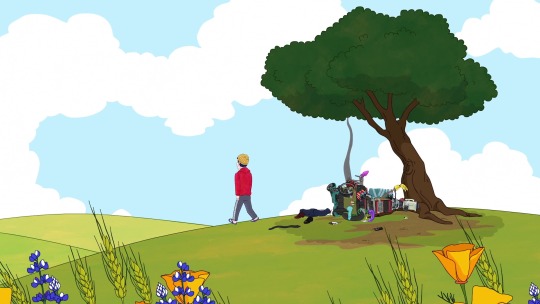
Well it took the entire fucking season, but I FINALLY get the purpose for Henry Fondle: Sex Robot. And while the entire episode (and season, honestly) has been tremendous, that this ridiculous fucking punchline was the vehicle to deliver the overarching point with a solid knockout punch of meaning AND pathos? Absolutely floored. That BoJack Horseman can be (and often is) brilliant isn’t a surprise, but the ways is keeps proving it often are.
So “The Stopped Show”, a tale of accountability and responsibility and how we’re all just guys.
Each of our main characters closes out this season alone (sort of), in assorted stages of realizing the main themes, or completely failing to. I find Diane’s arc the hardest for me to make a decision on, which isn’t surprising, as I think in many ways, Diane’s the most complicated character in the show. She delivers, directly and succinctly, one of the major points of not just this season but the entire show, but how does it relate to her? I’M NOT COMPLETELY SURE. I think part of the problem with (and for) Diane is that she knows better. She’s the most insightful character, she has a fantastic head on her shoulders, but only for everyone else. She’s this fucked up little disaster prophet, her vision clear and her message concise, unable to ever apply her gifts to fix herself.
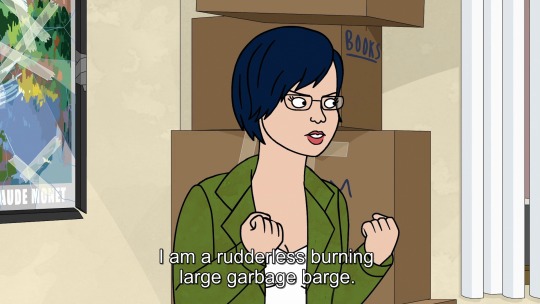
Diane is just as trapped as BoJack, but in a fun twist, is now lagging behind him in trying to do something about it. Nearly every single scene with Diane this season has been in this sad little room of her sad little apartment with all her sad little unpacked boxes, and no matter how much truth and wisdom she spits out, HERE SHE STILL IS, failing to correctly assemble IKEA furniture with names like Bȧcksleid. She already feels like shit for sleeping with Mr. Peanutbutter, so what does she do? THE SAME FUCKING THING. To which I groan and roll my eyes, while simultaneously being proud of her for directly and immediately setting him straight about not getting back together. Diane rides this constant line where she gets it but also doesn’t, which is so interesting to me in the level of additional frustration this makes me feel. BoJack is so self-absorbed you don’t really expect any better of him, which has the flip side of your expectations being so low that even the whiff of progress feels exceptional. Diane doesn’t come with any of that though, she knows better, you KNOW she knows better, and the consequence of this for the audience is that she winds up being more unlikeable than the guy who literally last episode nearly strangled his girlfriend and co-star in the middle of a paranoid drug-induced frenzy.
Which is fucked up! It’s intensely fucked up! And also, I think, the point! We expect more of Diane, and so feel more disappointed when she doesn’t deliver. Is that fair of us?
But there’s more here, as we pivot to the accountability portion of this episode/season. From the beginning of the show, it’s been incredibly upfront about how everything is unfair. We come back to this time and again. Privilege rules the day in the world of Hollywoo. Fame, money, charisma, gender, power. BoJack has been an asshole from pretty much the moment he set foot in the spotlight (possibly before?), and the only thing ever even attempting to hold him back has been the moments his guilt manages to scream loud enough to be heard over his internal narrative. Whatever he does, however he fucks up, he always stumbles back to his feet, and NEVER with any (broad scale) consequences. Meanwhile, here’s Diane, in her sad shitty apartment. Consequences haunt Diane, even if she’s the one doing the haunting. The crap things she’s done and the shitty choices she’s made cling to her.
There’s no fairness in that either, no justice. But Hollywoo (and the entire world around it) (and our world too oh yes) has that privilege carved into its bones, and Diane bears none of its marks. Her situation is very different from but parallel to Gina, who is just so fucked over, it keeps legitimately making me angry for her.
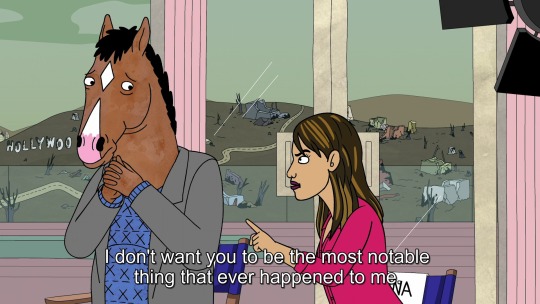
Gina, of course, brought none of this on herself. She made the mistake of caring about BoJack and trying to help him. OOPS YOU WERE A GENEROUS PERSON WITH AN OPEN HEART FUCK YOU LADY. For her trouble, Gina has been assaulted and traumatized, AND she is in very real danger of her career being over when it’s only just finally beginning. And she KNOWS THIS. That’s the part that I keep coming back to. All this should be an aberration, an anomaly, and while that may be true of the specifics, conceptually, it’s so commonplace that Gina already knows how it’s going to play. She’ll stop being Gina and become The Woman Nearly Strangled To Death By BoJack Horseman. Even if she’s able to keep working, this is what she’ll be asked about in every interview forever. Even if she convinced people to genuinely listen to her, BoJack would, at worst, get a slap on the wrist as he stumbles back to his feet. We know that, WE ALL KNOW THAT, because it happens all. the. fucking. time. Gina did nothing wrong, but this would still define her for the rest of her life, while for BoJack, it would maybe become a footnote on his Wikipedia page.
Nothing about that is FAIR. Nothing about it is JUST. Gina’s choices shouldn’t have to be “this becomes my entire life” or “swallow this down and pretend it never happened”. But it is, as it has been in perpetuity for the victims of the privileged.
So then what can we do about it? Well that’s really the question, isn’t it? This episode answers it in an assortment of ways (I think the entire SHOW is very much about this, really, but this episode is for sure coming with guns blazing), while also showing us why none of those answers can work. It’s funny and sad and awful and true, but also, ultimately, the most hopeful answer because it’s the only one you can actually affect: It’s you. It’s me. It’s each and every one of us, individually, making a choice to be better.
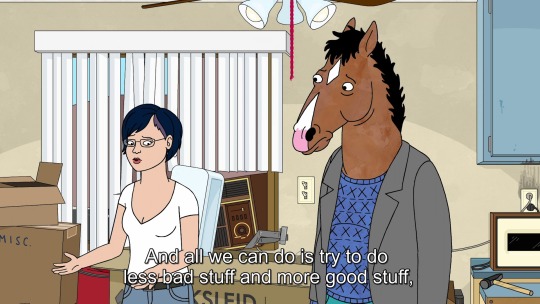
And believe it or not, we embody this with Henry Fondle: Sex Robot.
I thought the whole thing was so unbelievably stupid. Half the season, we’ve had this goddamn multi-dildo’d juvenile frat boy joke running around with its stupid ass Speak-and-Say voice, doing the same shtick over and over, and I’m like, “okay this is just the shit I have to put up with to get the clever stuff, I guess.” BUT THAT’S EXACTLY THE POINT I’M SITTING THERE LIVING THE ENTIRE GODDAMN POINT AND MISSING IT. Henry Fondle: Sex Robot is seventeen shades of overt horribleness, AND WE ALL JUST GIVE IT A PASS. It’s just the way it is, the way the world works, the price of doing business. When the whole time -- THE ENTIRE FUCKING TIME -- all it took was one person to say no. One person who could see the game we all are playing and was willing to give up everything to stop it.
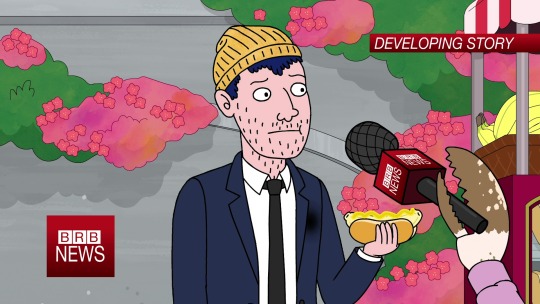
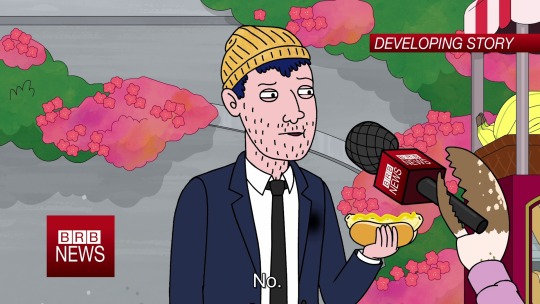
Hilariously, Henry Fondle IS a metaphor, sort of, but of the saddest kind. He is literally a robot, he can’t possibly change. What’s more, media fervor will never affect him, fallout will never touch him, and the powerful will always rally around themselves to retain their power. It takes Todd, the head of the company, the creator of Henry Fondle, and the one person who would benefit most from the unending efforts of the rest of the world bending over backwards to avoid the truth, to put a stop to it. In doing so, he immediately returns to his old, homeless, destitute self, but doesn’t once hesitate or look back.
It’s Todd, and only Todd, that stops that madness, because while individual people are a problem, the world at large is too. Stefani makes a great point that Diane holds herself and everyone else to impossible standards and a little forgiveness and grace wouldn’t go amiss, but when Diane suggests they apply that philosophy to their clickbait gossipy shit on their website, it’s just
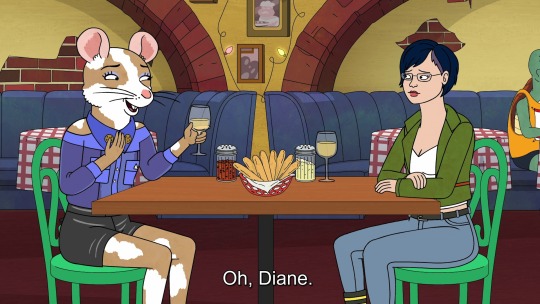
Which again, is beautifully cynical and depressing, but not untrue. Fostering a more forgiving culture isn’t in stopping websites from posting clickbaity takedown articles, it’s each person deciding not to take the clickbait. We can absolutely have a conversation about the people creating their world or the world creating its people, but when you boil it down, only one of those things can you yourself absolutely and directly change, and it’s not the entire world.
A THING DIANE GETS BUT SIMULTANEOUSLY ABSOLUTELY DOES NOT.
I can’t take myself away from this Diane thing, I know, but only because she’s the fucking CORE of each and every one of us struggling with this idea. She’s the simplicity of it and the complication all in one. Not BoJack, which is NOT where I thought we’d be when we started this journey. BoJack is more an action on the people around him at this point in the story, he IS the world you cannot change. He’s pointed to rehab, and off he goes -- or doesn’t! I don’t think it’s coincidence that we stay with Diane and watch her watching him.
Oh, Diane, indeed. As she tells her story of her friend Abby, who threw her over for the cool kids, who turned every confidence into a scar. Who Diane still helped anyway, because Abby needed her. Did Abby learn from that, did she get better? We don’t know; we stay with Diane and watch her watching Abby. Diane, who can so completely understand about personal responsibility while failing to recognize her own enabling for the shitty things that keep happening to her.
You can control yourself. That’s it. That’s the only playground with a guarantee.
Will BoJack go off to learn that? Will Diane stay and figure it out?
THAT’S WHAT NEXT SEASON IS FOR
Something I was toying with including in this, but ultimately decided against for a variety of reasons, was the contrast between BoJack’s take on personal responsibility independent of external response, and The Good Place’s argument that people need external support for personal growth. An idea I may not have even considered contrasting save that Doc’s talked before about these two Jewish creators with what are clearly very different philosophies, and basically, if she were ever able to manage a discussion between them on this, I’d love to be in the room. I’ll be very quiet and not get in the way, I promise.
#jet wolf watches bojack#a novel by jet wolf#this has been so hard to write and consolidate into a series of thoughts that made some measure of cohesive sense#i'm still not sure i've managed it#but i'm pretty sure i've kicked it around about as much as i'm able at this point#IT WORKS OR IT DOESN'T I DON'T KNOW FLY MY PRETTY
20 notes
·
View notes
Text
“…I should hardly need to say by now that the idea that there is an intellectual downturn in early medieval Europe (or indeed medieval Europe more broadly) is a part of a specific imperial colonialist historiography which seeks to argue that any point when Europe wasn’t violently subjugating the world around it was necessarily a bad time. To this way of thinking, when the Roman Empire goes around turning everyone into slaves and violently opposing anyone it can get its hands-on things are good, because also some amphorae are traded across the Mediterranean; but when there isn’t one giant state oppressing everyone things are bad because fewer amphorae.
This is obviously a stupid and racist position which presumes that the nice things which rich Romans enjoyed (slaves and hegemony) were available to everyone, and also requires us to just ignore the fact that slaves are people. Rome wasn’t a very nice time for the great majority of individuals, and the medieval period had plenty of nice things for the average person – you just got fooled by a later medieval advertising campaign for art and a bunch of people who wanted to do slavery in the modern period. Accepting the idea that Europe did suck in the medieval period is automatically ascribing to this racist and imperialist version of history. In order for a society to be good and have worthwhile things it doesn’t need to be constantly attacking other cultures and enslaving people. Look inside yourself if you think that is true.
Another reason why this falls down as an argument is also that the whole “Europe as an isolated not trading enemy in opposition to the Arab world which had nice things and was gloriously well-connected” thing is not how things happened. If, for example, we look at trade routes in the earlier medieval period as a starting point we see that is in no way the case. We do see a drop off in international shipping when the Roman Empire collapses.
This is because the Empire itself used to ship goods along with moving troops in its fleets of tax-funded vessels. This existed alongside independent trading, which also moved stuff like olive oil from the Iberian peninsula or amphorae out of what is now Tunisia. Once there is no longer a state propped up by taxation doing shipping itself, shipping across the Mediterranean also slumps. That does not mean that it stops.
While we see a decline in movement, the key here is that we see a decline, not a total cessation. Movement very much continued throughout the early medieval period, and we have ample pot-shard based evidence to back that up. Yes certainly many people shifted to making their own pottery, but rich people could still get their hands on the good stuff if they wanted to.
You know when European shipping in the Mediterranean really slowed down? After the Muslim conquests. Where there had been a lively shipping economy suddenly there were a bunch of real bad ass guys who had carte blanche to intercept the ship of any infidel they could find. Oh and if you could take some of their land while you were at it, that would be great. All of this was made possible famously, the Umayyad conquest of Hispania went really well, felling the Visigothic kingdom on the Iberian Peninsula and turning all those olive orchards over to Muslim rule.
In quick succession, you then see the establishment of the Emirate of Ifriqiya on the North-African coast, as well as the Emirate of Sicily on, well, Sicily. In other words, a lot of the Western Mediterranean just wasn’t Christian any longer, so it’s kinda weird to blame Europeans for not maintaining trade routes there. You can’t simultaneously demand that Europeans trade more with the Muslim world while ignoring the fact that the Muslim world was also a part of Europe, and very much interested in dominating any extant trade routes.
This narrative also completely ignores the fact that there was thriving trade which existed all through this period. We have plenty of records on port tolls and taxes which tell the story of luxury goods crisscrossing the continent and across the Mediterranean, regardless of who was doing what. Walrus ivory and amber from the Baltic coast ends up at the Eastern Roman court in Constantinople.
Furs, honey, and elephant ivory popped up basically anywhere anyone had the gold to trade for it. Oh and gold, which largely came from Africa, was around the shop too. Indonesian spices like pepper and nutmeg featured happily in European cuisines, and lapis lazuli from Afghanistan was being ground into ultramarine. You want luxury goods? They were there, because trade was still happening. It just wasn’t happening on an imperial scale – an undertaking which I will again remind you takes a whole lot of slaves to maintain. The idea that Europeans were an unwashed and unrefined mass in opposition to the glories of life in the Arabic world just doesn’t hold up to scrutiny.
The backward post-Roman Europe versus glories of the East narrative also very helpfully ignores the fact that one of the glories of the East was the still extant Eastern Rome – with its afore-mentioned capital in Constantinople. (You may also know it as Byzantium, but we are trying to be precise here.) Of course, Eastern Rome was one of the big losers in the whole Muslim conquests thing, losing its extremely valuable territory in Egypt, which accounted for a huge amount of its tax revenue. It also very famously lost the near east more generally.
Having said all that, it was still a major maritime power, owning territory on the Italian Peninsula in what is now Calabria and Apulia. Constantinople was still very much about that Roman life in the medieval period, with a keen popular interest in Chariot racing, a lively trade with the near East and Western Christendom, and even what could be seen as a sort of pre-modern welfare state, ensuring that its citizens in cities always had enough grain to eat. If we want to pretend that everything was bad and gloomy in medieval Europe compared to the Arab world because Rome collapsed, how then do we account for the fact that it was actually still going at that time, and trading just fine?
Obviously then, narratives of trade stopping totally in medieval Europe are incorrect and overwrought, but why would I say that buying into them supports a colonialist narrative? The answer to that is saying that Europe didn’t have anything nice, as opposed to a flourishing Arab world is a way of justifying the violent incursions on the part of Europeans into the Middle East.
These arguments usually hinge on the idea that before the Crusades, Europe was a disgusting place full of people who didn’t bathe and nothing but unsalted porridge to eat. All of that changes, in theory, with increased contact to the Middle East with the establishment of the Crusader States in the middle east. The theory goes that it wasn’t until Europeans were able to carve their own ports out along the coast of the Levant that anything nice got into Europe at all. Without Europeans at Jaffa, there would be no spices, oranges, or rice in Europe. Hell, without all that religious violence maybe Europeans never would have anything nice ever!
That is not only factually incorrect, but it is a way of justifying what amounted to centuries of attempts to violently subjugate the Holy Land. Sure, all that violence was unseemly – but access to the Silk Road! It also amounts to a convenient justification for modern imperial and colonial violence. Well Europe was a terrible hell hole! What choice did they have other than to sail around the globe, enslave huge swathes of people, do a spot of genocide and begin to extract all possible value from any native people! After all, everything they had before they started in on the colonising in earnest was bad.
None of this is either historically correct, or acceptable. We can, and should, point out the major advancements that Mulsim society presented to the world. There is absolutely no doubt that there was a tonne of interesting stuff going on in the near East, and I in no way dispute that assertion. What is incorrect is the idea that medieval Europe was cut off from that brilliance, a backward hole where there was no trade, no spices, no intellectual culture.
Europe and South Western Asia have always been connected, and indeed the term “Arabic World” very much includes huge swathes of Europe at various points during the medieval period. If you want to say medieval Europe is a sad foil to the Muslim kingdoms, how do you account for the several European Caliphates? If you want to say that without the Roman Empire Europe lost everything bright and worthwhile, how do you explain the still up and running Eastern Roman Empire? If you want to say that without post-Crusades trade there never would have been meaningful trade in Europe how do you explain all the fucking trading?
The desire that many have to defend the medieval Arab world and its culture in the medieval period is laudable. I in no way am here to argue that it had a lot of good stuff going on. However, pretending that all of this had nothing to do with the European world and trade, or that the only place where intellectual advancement was happening was the Arab world is simply incorrect.
The medieval world was complex, interconnected, and very much a part of an on-going scholastic tradition. To argue that without violent force Europe would have languished as a dull afterthought it to argue for imperial colonialism. Medieval Europe was a vibrant and well-connected place, and it could have continued to be so without all of the slavery and genocide. Europeans didn’t need to rape and pillage their way through the world to learn and grow. They just did it because they could.
Pro-imperialist historiography is the air that we breath here in the decaying carcasses of the modern Imperium. I am extremely sympathetic to the urge to celebrate non-white cultures, and I spend quite a lot of time doing so myself. However, to argue that this was happening without any contact with Europe, and that Europeans cannot think or enjoy luxuries without also being involved in a violent imperial enterprise is extremely dangerous.
I know that the people who make this argument think they are being enlightened, but they are still making a pro-imperial argument when they trot out tired myths about the medieval period. We don’t undo the colonial historiography by agreeing with it. We need to write our own history which admits that every world culture has something useful and beautiful to offer us all, and that a better world can be achieved without the subjugation of others.”
- Eleanor Janega, “On colonial mindsets and the myth of medieval Europe in isolation from the Muslim world”
7 notes
·
View notes
Note
I suppose because politics is what means I have no future of any kind left, so it's hard to be silly about it. And I seem to have landed myself in a sector of social media filled with people who are very smug about how smart and nihilistic they are, and I hate all of you with the hatred that only a miserable, powerless person can feel.
I don’t buy it. Unless you are quite literally scheduled to be executed at dawn, “no future of any kind left” because of politics is catastrophizing. People in very dire circumstances the world over often manage to build some kind of life for themselves; it may not be the life they want, and the suffering they endure because of the circumstances they are limited by should not be dismissed, but to say that someone in such adverse conditions has no future is to infantalize them and deny them the agency they do have to shape their life to some extent.
And this is an insight I’ve found important when dealing with depression in myself: even if one’s catastrophizing is not irrational (say, you’re a queer person stuck in an extremely homophobic environment, at minimum for the next 5-10 years), that does not mean it is useful. To put it another way: circumstance might justifiably make you angry and sad and frustrated. That may be rational. Deciding, in the face of that anger and sadness and frustration, to surrender to it is not rational.
So--assuming that you are not a political dissident due to be executed, nor suffering from a terminal illness which somehow for political reasons cannot be cured (if either of these things are true, you have my sincere condolences)--I have to say, this ask reeks of someone who’s depressed. If you are depressed, you will always be able to come up with reasons why happiness is unattainable for you, due to circumstances entirely out of your control. This is not a crazy thing to think, because if you are depressed and not treating that depression, most if not all the things you try to do will not solve your unhappiness because they are usually orthogonal to what is making you unhappy. Your very ability to accurately imagine future happy states and what might bring them about is suppressed by depression; for instance, you might, if you are depressed and you know it, rationally understand that exercise often helps with your depression, but be unable to motivate yourself to exercise because the intuitive link between if I do X I will feel better is broken by an internal forecasting system that refuses to spit out predictions other than “nothing I do will help with anything.”
A depressed state is not a psychotic break--it doesn’t cause you to lose touch with reality--but I think depressed people would sometimes benefit from treating it like one, because it does subvert your ability to accurately model the world, and therefore you can’t trust your own ability to reason or intuit about certain topics. I have both experienced this from the inside, and seen it from the outside: friends whose depression causes them to believe they are unlovable, and thus that nobody loves them, even when told (and shown) repeatedly that they are very much loved, and very important to the people around them.
In fact, you remind me of this post: depressed and anxious people who notice politics is depressing and anxiety-inducing, and that depressing and anxiety-inducing problems confront the world and society, and therefore conclude that their depression and anxiety are a rational and reasonable response to the world. But that doesn’t follow at all! A lot of responses to a depressing and anxiety-inducing environment are more useful that shutting down and withdrawing, or letting yourself be paralyzed; and even if there are negative external factors in the world affecting your life, if you have nothing in your life that is a sufficient source of joy to offset these things at least somewhat, then you have problems sufficiently severe that I don’t think your depression or anxiety can be laid at the feet of the world at large alone; more likely, you’re dealing with shitty personal circumstances, and these are far more likely to be tractable to your individual capacities than, like, all of climate change. And if you do have some sources of joy in your life, you can cultivate those further.
To put it another way: humans are very bad at reasoning about things on large scales or over large timelines. One reason we’re slow to solve problems like climate change is that we tend to be pretty blasé about remote and impersonal problems, which is actually often useful as well--because it means we’re capable of adjusting our hedonic barometer to create joy even in catastrophic circumstances. If you are constantly worried about big issues like climate change or the Trump presidency to the point where you can never do that, then the conclusion you should draw isn’t that you’re a uniquely rational human being with a uniquely accurate worldview, it’s that your brain is broken and you should not trust your intuitition.
Emotional states are not rational models of the world. They are tools our brain uses to motivate certain kinds of action. They probably have their origin in our social evolution, but this means they are extremely untrustworthy when it comes to complex, large-scale, philosophical, or impersonal issues, because these are not scenarios our brains evolved to handle before the advent of high-population, highly-stratified societies.
Now, I realize it’s hard to convince someone they are depressed and/or should seek treatment by rational argument (lord knows I’ve tried in the past!), because after all, if we were being perfectly rational, we would not feel depressed. We wouldn’t feel anything; again, emotions are contingent tools, not highly rationalized responses to the world! So I won’t belabor this point any longer. Instead, now I’m going to get annoyed with you.
Because here’s the other thing depressed people do--and I have done myself. They see people who are not depressed, whose hedonic barometers are functioning normally, and capable of experiencing joy even in arguably (or inarguably!) shitty circumstances, and they get mad at them. How dare you be capable of laughing at a joke, or sharing a meme, or having a nice day, when everything is so bad!
This is a common response, not only from depression, but also I think from grief, or fear, or trauma, or lots of other things. But it’s bullshit. I’m sorry, but you don’t get to demand that everyone feel your suffering as acutely as they feel their own. You don’t get to demand that just because you’re a pessimistic ball of frustration and anger that everyone else be, too. You get to--and ought to--demand that people treat you with empathy and respect, but that doesn’t mean they don’t get to make jokes about topics you find depressing as hell. Yes, even topics that personally affect you, and may not personally affect them (though, of course, a lot of times people assume the person making the joke isn’t personally affected by the topic, when in reality they are and the joke is a way of relieving stress and coping with frustration).
That calvin and hobbes meme I reblogged is an extremely generic political compass meme; the only relevance it has to the world today, I suppose, is acknowledging that, like, politics is a thing that exists. If you’re upset by that--how dare people laugh at politics, the source of all my problems--you’re being a dick.
And this leads my to my final point, which is this: while we are all of us owed compassion, we also owe others compassion. And people caught up in their own anxiety and depression and anger often don’t see the way their emotional states impose costs on the people around them. They often treat the people around them badly--worse, at any rate, than they normally would--and react defensively if this is pointed out to them.
I’ve done this. I have friends who have done this. I get it. It doesn’t make someone a horrible person! It doesn’t meant they deserve to feel the way they do. But it does create the second half of a twofold moral obligation. You see, I believe that the, call it “utilitarian selfishness” view, is essentially correct: if all humans are of similar moral worth (they are), and you can only help one person (often true), and that person is yourself, it is no less moral to help yourself than it is to help someone else. This is usually framed as a grant of permission: “you are allowed to be selfish sometimes.” But it’s also an obligation: “you should not be a dick--even to yourself.” You have a positive obligation to care about your own suffering! And you have a positive obligation to try to reduce the costs your suffering--your bad mood, your depression, your anxiety--imposes on the people around you.
Because I’m not a smug nihilist. I actually believe, with embarrassing intensity, in a large number of abstract principles. And while I believe circumstance or injustice can conspire to make people feel miserable and powerless, and I have the utmost sympathy for you feeling that way, no one is so omnipotent as to be able to truly excise our power to do something with our life that is rewarding to us, no matter how modest. Your subjective feeling of misery is not license to be a dick to people, or to misrepresent them or their motivations. And if reading my tumblr (or anyone else’s) makes you miserable, you have a positive moral obligation to stop, because you’re being a dick to yourself, which is no more justifiable than being a dick to me. And being a dick to me because you don’t like my Tumblr, because you’re miserable and I’m not, is pants-on-head stupid.
I, too, have been so convinced of my misery and powerlessness, and so utterly convinced of my inability to make improvements in my life, that I have yielded utterly to the feeling of myself as a despised, helpless, wretched thing. You can spend years in that state. A lifetime, even. I suppose it relieves you from the burden of having to try, which is a tiny shred of comfort when the climb up the hill seems so steep. But I have found that in the long run it brings no other relief; there’s no regression to the mean, just an endless prolongation of misery. It required some courage, and not a little determination, to try to climb out of that pit. Sometimes you struggle. Sometimes you fall back in. Sometimes it’s easier to believe there’s nothing beyond that place of unhappiness. But there is, and you can get there, and the choice of whether or not to reach it lies only with you.
#if you are in fact due to be executed ignore this#and you have my deepest condolences#but in that case how did you get on tumblr???#Anonymous
88 notes
·
View notes
Note
12 or 34 for the ask thing if i may request!! :3
How long has it been? A month? A month and a half? Two months? What is time? Anyways... Finally got around to this. My original goal was to do one for both... but then I got carried away so uh... just one will have to do.
I went with #12 (”can i be of assistance”) and decided that I felt like writing a little 'slice of life' bit for my AU. Somehow that divulged into me writing an entire short scene.

...anyways. So if this is canon it takes place about eh... a week or so after Henry meets Victor and the creature on the mountain (which I haven't written yet), and they're all just starting to kinda get used to living up there together. (Henry also went back to civilization during that week in between to get a few supplies so... hence they have some cookware!)
CW: An explanation of how to quarter a rabbit carcass for cooking (not really graphic or anything but I know some people might get a little icky about that)
Here you go. Sailor, I apologize in advance. It is poorly conceived and poorly written but here it is anyhow.
“Can I be of assistance?” The creature spoke softly as he watched Henry tend to a small fire that burned beneath a dutch oven which hung from a makeshift tripod of branches. Henry paused his shifting of the glowing logs and glanced up at him with a kind smile.
“Actually, I believe you can,” he answered, then gestured toward the cabin. “You remember the rabbit we trapped this morning?” The creature nodded. “It should be on the table inside. I believe Victor’s already taken care of skinning and gutting it, but it will need to be quartered. Do you think you could take care of that?”
“I can certainly try, though I am… admittedly unsure of how one might go about that process,” the creature replied, hanging his head in shame from how little he knew about much of anything. Henry stretched and stood upright, a sympathetic look in his eyes.
“No need to be worried, I shouldn’t have expected you to know,” he mentioned, motioning for the creature to follow him back inside. On the kitchen table inside was the rabbit carcass, laid haphazardly aside along with various other foraged ingredients ranging from wild garlic to chanterelles, wild carrot to wild thyme which, in stark contrast, were kept in neat piles of their own. “Now, Victor would be the better candidate to give you an anatomy lesson,” Henry explained as he moved over to where it lay. “But I know enough to at least help you get by, I hope.” He placed the carcass on its back with one hand, grabbing a knife that lay aside with his free hand, and the creature stood over him, watching intently. “Your goal is to divide the carcass up into manageable pieces. The best way to do that is to remove the front legs-” He wriggled the two short front limbs in demonstration. “Remove the two hind legs-” He gestured down toward the thickly muscled hind limbs. “And separate the ribs from the loin section.” He ran the back of the knife along where the rib cage ended and the posterior half of the back began. “The front legs will be the easiest. Just run your knife under them and pull up beneath the shoulder blade and they should come right off. As for the hind legs, it's best to make cuts where they join with the back muscles, then crack the joints where they meet the hips, finish cutting through and they should come free. Separating the ribs is similar, cut around where they end, then crack the backbone from there.” He set the knife down and set the carcass on its side, looking back up at the creature. “Think you got all that?” The creature nodded.
“I believe so.”
“Let me know if you need my help! I’ll just be outside,” Henry beamed with a cheerful grin as he gathered up the other ingredients on the table into his arms and whistled as he briskly walked back outside. The creature watched him go, curious about how someone could seem so happy all the time, then turned his attention back to the task at hand.
It was no more than a minute later that the creature emerged from the doorway, though it looked like far more time had passed. The small fire was now considerably larger with fresh logs, flames lapping at the sides of the dutch oven that hung over it, steam mingling with smoke and drifting into the sky. Henry still sat fireside, but now beside him, sprawled out on the stone with one hand dangerously close to the fire, was Victor, who appeared either thoroughly exhausted or tired of existing. “I have completed the… quartering,” the creature called out quietly, sounding unsure of himself. Henry looked back at him with an expression that was somewhere between confused and impressed.
“Already?” The creature nodded. Henry thought a moment, then chuckled and shook his head. “Ah- that’s right. I’m sure those bones snapped like twigs between your fingers,” he mused, turning back around and poking at the logs with a large stick. The creature didn’t answer, instead averting his eyes at the mention of his strength. His mind began to race with thoughts and memories of the past that made him feel suddenly sick, but Henry’s voice rose above his internal din and snapped him back to the present. “Well… we’ve still got a little bit of time before I’ll be needing it. Do you want to try deboning it for me?”
“So long as you would be able to instruct me, yes,” the creature replied. Henry poked at Victor’s leg with the other end of his fire stick.
“That sort of thing is more Victor’s expertise,” Henry mentioned as Victor shot him a frustrated glare.
“Nope. Not doing it,” Victor grumbled, letting his head fall back to the ground a little too hard, resulting in a grunt of pain and a wince.
“Come on, Victor, get up and help him,” Henry insisted, prodding his leg again. Victor groaned and slowly lifted himself half upright.
“I’m too tired,” he complained, rubbing at the back of his head where it had hit against the ground. Henry gave him a doubtful smile, which Victor simply couldn’t resist the charm of. His own grumpy expression quickly changed to a sheepish smile, his cheeks heating as he blushed from the thought of how even something so small as the way Henry looked at him could make him so suddenly willing to give in. He tried to hide his expression, which only made him blush more as he realized that by trying to hide it he was only digging a deeper hole for himself in revealing how he felt. “Well-” he began, his voice cracking, which earned him a snicker from Henry, who at this point was now idly stirring the contents of the cast iron pot. That made him blush even more and he jumped to his feet, clearing his throat. “That is to say- well- I guess I could help,” he murmured. The creature tilted his head at Victor’s sudden change of heart, now entirely intrigued and curious about the nature of the relationship between the two of them.
“See? Dealing with Victor is all about persistence,” Henry called back to the creature. Victor tapped his leg with his foot.
“Don’t push it, Henry,” he muttered. Even though he was trying to look serious, he still had a slight smile on his face. Henry grinned and pushed his foot away.
“Oh hush, I didn’t say anything that wasn’t true,” he quipped, tapping the long spoon he was using to stir with on the edge of the dutch oven before placing it back down on top of the lid that lay at his side. Victor rolled his eyes with a smirk and began striding off toward the cabin, where the creature had already slipped back inside in hopes of avoiding their… argument? Was it an argument? He couldn’t quite tell, but it was confusing, and he didn’t want to try to make sense of it.
“Alright first things first,” Victor announced from outside. “Deboning a rabbit is just like deboning a corpse, just on a much smaller scale…” Henry held back a snort of laughter as he heard Victor’s monologue trail off behind the closing of a door. Prodding at the logs of the fire once more, he sighed and lay back with a smile.
“Living with those two is bound to be an adventure,” he remarked out loud to himself. He exhaled a soft, happy sigh and closed his eyes. “An adventure well worth taking.”
#ask games!#frankenstein au#henry knows how to cook and forage in this au and i think that is extremely good and wonderful of him send tweet
16 notes
·
View notes
Text
GOD tumblr is so fucking weird about vegans. I s2g half of y’all are all “uwu I can’t wait to have a dandelion lawn and a veggie garden and a chicken coop also here’s a cow in a flower crown #cottagecore” and then turn around and reblog a post that’s like, “DAE THINK VEGANS ARE SMUG PETA-SUPPORTING BASTARDS WHO CARE MORE ABOUT PIGS THAN THE BROWN PEOPLE WHO DIED FOR THEIR QUINOA?” Wow, bro, sick take, where’d you get it—reddit in 2013? Like, if you have been ~personally victimized~ by a mean vegan, I’m real sorry. But surely….surely tumblr is capable of understanding that the vast majority of vegans are just, like, hanging out, making personal choices, not eating animal products. Like, a few years ago, I saw a hidden-camera video from inside a factory farm, and I thought, “Gosh, that is really awful and makes me feel super sad; I wonder how hard it would be to cut down on eating meat and dairy?” Turned out to be pretty easy for me, actually, and getting easier all the time.
So many of the arguments y’all make about vegans are actually just about capitalism. “ALMONDS ARE DESTROYING THE SOIL :(” True! But if you keep reading, it turns out so are bananas, coffee, rice, sugar, and hmmmmm looks like there’s one more thing on this list—it just says, “one billion cows worldwide.” YES, outsized production of monocrops for commercial sale is an enormous problem, and we should all be more mindful of how our consumption habits affect the environment, and also uhhhh livestock make up 14.5% of the world’s greenhouse gas emissions, so if you’re looking to make some cuts, that’s probs a good place to start. It’s easy to point the finger at “weird” “new” “vegan” foods like jackfruit (scare-quotes bc these are often just foods Westerners didn’t know about 30 years ago) when they represent a change in the global market, and powerful people who stand to get even richer from factory farming point that finger gladly while carefully avoiding the dairy cow in the room. Like, yeah, turns out that while jackfruit and almonds and avocados AND BEEF are nutritious foods, they are pretty difficult to produce at global-consumption scales year-round, and anyone who is trying to minimize their personal contributions to greenhouse gas emissions should definitely not eat those foods very often. Better yet, we should probably all educate ourselves on how to eat locally-grown, in-season food and how to provide it for our neighbors in food deserts.
Going vegan is not the only good choice and will not save the world alone, but there are also very good, well-supported reasons to do so, and I’m sick of reading these dumbass “uhhh PETA sucks actually” arguments against it. Sure, if you have a medical, financial, or religious reason to eat certain foods, then of course, do your thing. Can you eat less meat? Less cheese? More local produce? Anyway, at this point, I’m pretty confident that this vegan strawman the Internet has constructed is only there to make people who don’t want to examine their own consumption habits feel better about that choice, and that’s not very #cottagecore of them.
2 notes
·
View notes